




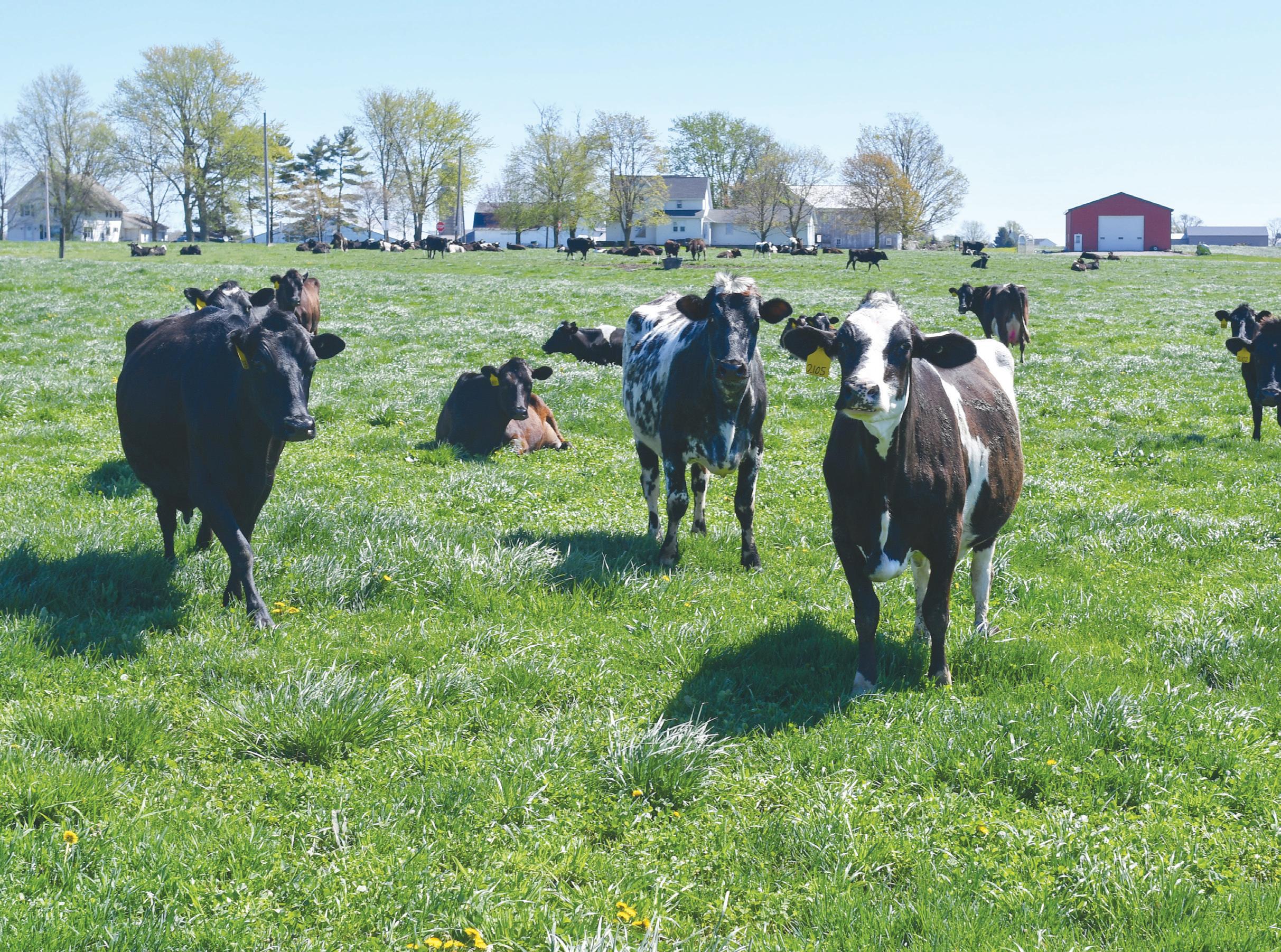
chain. At the farm level, MMPA members are also on a sustainability journey. MMPA members Mike and Sue Martin focus heavily on the health of the soil on their grazing-based dairy herd in Wakarusa, Indiana.
The U.S. Department of Agriculture has confirmed Highly Pathogenic Avian Influenza cases in several dairy herds throughout the U.S. Implementing biosecurity measures is essential to safeguarding dairy farms from the threat of HPAI.
On April 12, 2024, Michigan State University (MSU) initiated construction on their new MSU Dairy Cattle Teaching and Research Center. This $75 million endeavor marks a pivotal step forward, enabling researchers, students, and staff to embark on more ambitious ventures than ever before.
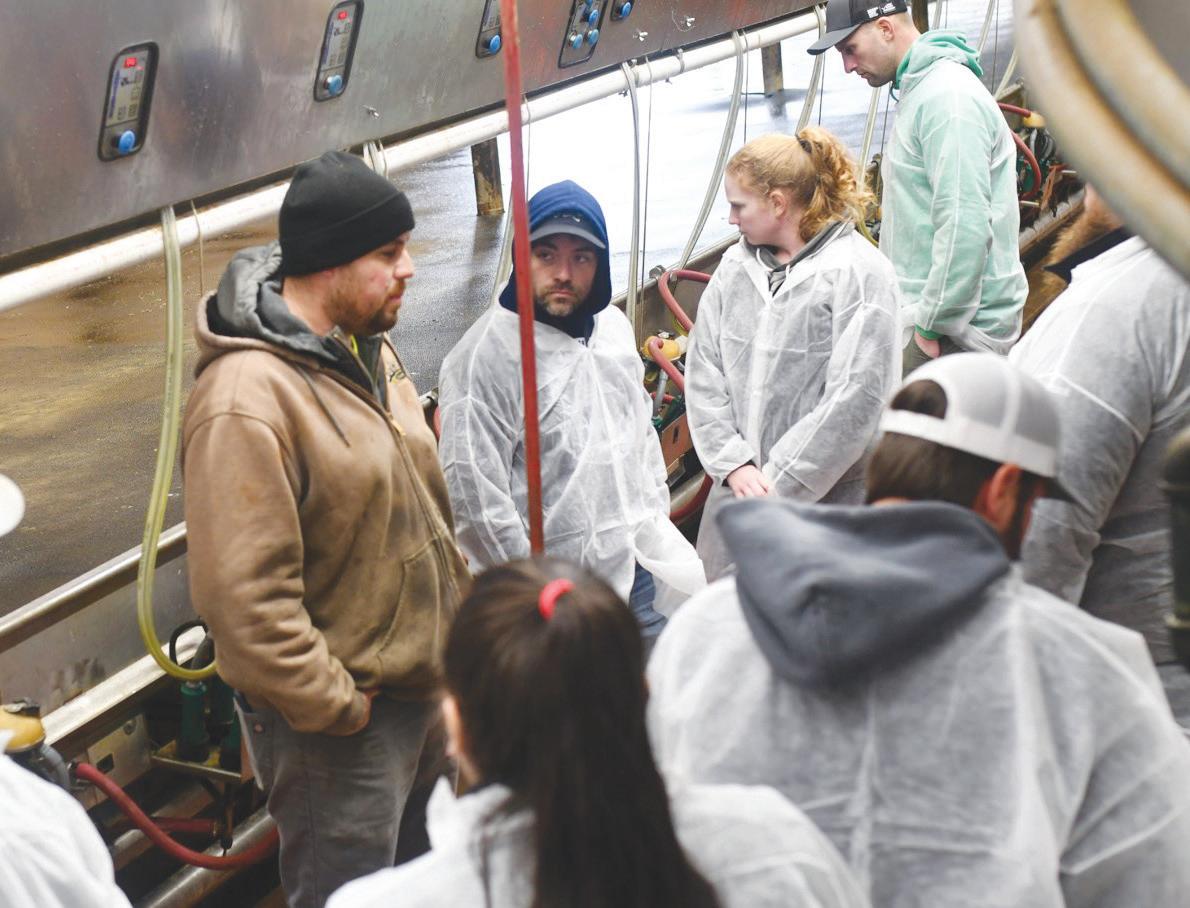
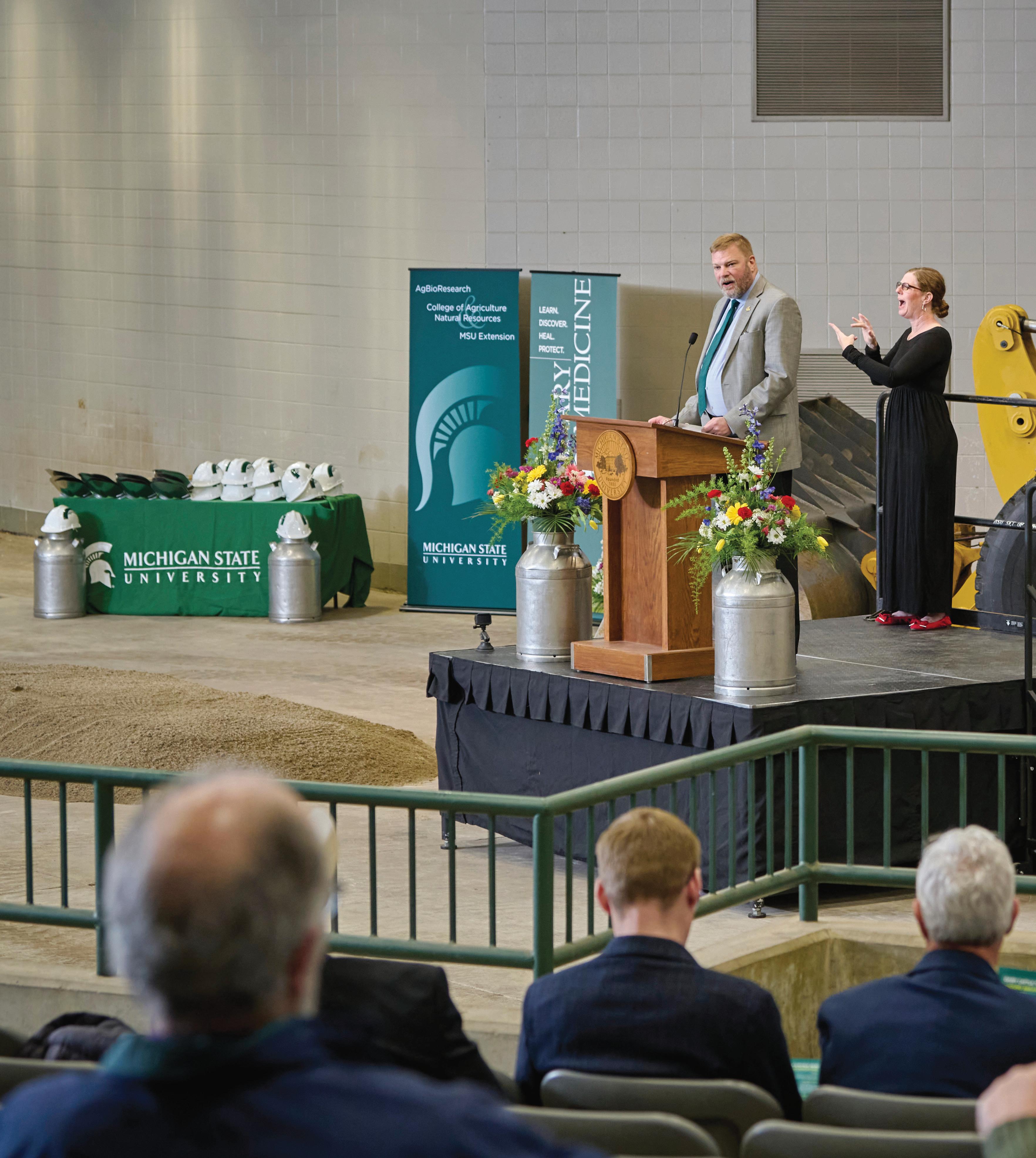
“After visiting the Superior Dairy plant as part of MMPA’s CORE program, I’ve seen first-hand how our quality milk gets processed and its significance.”
PAUL KEENER, MMPA DISTRICT 1 DIRECTOR (PAGE 17)

Amidst challenges like the recent Highly Pathogenic Avian Influenza outbreak in dairy cattle, the dairy industry has rallied to work together and prove their commitment to ensuring a safe and secure milk supply. With every biosecurity measure taken by employees on farms, practice embraced by essential farm visitors, and breaking new information acted on, we’re working together to safeguard our farms and our neighbors. Biosecurity tips for farms are available in this issue (pg. 18), and you can learn more about MMPA Board Chairman Doug Chapin’s perspective on HPAI and biosecurity (pg. 6).
This issue embodies the dairy industry’s continued resilience and proactive adaptability in the face of challenges like HPAI. Recognizing the changing membership in 2022, MMPA put together a task force to improve information sharing and modernize MMPA’s governance structure. As a result, MMPA recently hosted several CORE program events, one of the outcomes of the governance changes. Learn more about those recent events on page 24.
In the continued spirit of change, we also met with key Michigan State University stakeholders involved in the breaking ground of the new MSU Dairy Facility planned to open by the end of 2025 (pg. 20). The new facility promises a consumer-friendly approach and enhanced research opportunities to continue allowing dairy to advance for years to come. Also inside, you can meet new MMPA board member Paul Keener (pg. 17), learn about unique sustainability efforts on Wakiana Dairy in Wakarusa, Indiana (pg. 14), and view the list of Michigan Dairy Memorial Scholarship recipients (pg.16).
VOL. 106 / NO. 6
Milk Messenger (USPS # 345-320) is published bimonthly by the Michigan Milk Producers Association, 41310 Bridge Street, Novi, MI 48376-8002. Periodicals postage paid at Novi and additional mailing offices.
POSTMASTER: Send address changes to Milk Messenger, PO Box 8002, Novi, MI 48376-8002.
President and Chief Executive Officer
Joe Diglio
Managing Editor
Sheila Burkhardt, Chief Corporate Affairs Officer
Editors
Emily Kittendorf, Editor & Advertising Manager
Mikayla Bowen, Editor messenger@mimilk.com
Publication Designer
Stacy Love rezudesign.com
Printing Foresight Group, Stacey Trzeciak staceyt@foresightgroup.net
Publication Office
MMPA Milk Messenger P.O. Box 8002, Novi, MI 48376-8002 p: 248-474-6672 f: 248-474-0924
e: messenger@mimilk.com w: mimilk.com
Established in 1916, MMPA is a member owned and operated dairy cooperative serving dairy farmers in Michigan, Indiana, Wisconsin and Ohio.
An Equal Opportunity Employer – F/M/V/D
Subscriptions: mimilk.com/subscribe MMPA members - 50¢ per year Non-members - $5 per year
Circulation: 2,600 (ISSN 0026-2315)

Highly Pathogenic Avian Influenza (HPAI) was found in dairy herds in Texas in March, since then the situation has continued to evolve and reach other parts of the country. While we continue to learn more about the virus every day, our industry is collaborating to navigate the changing situation. We know that HPAI is affecting not only dairy cattle but is harmful to the poultry industry. We need to do our part to prevent the spread of HPAI to not only be a good neighbor, but to assure our consumers of a safe, healthy food supply. We have to let our neighbors and consumers know that we are all hands-on-deck and doing everything we can to prevent HPAI and keep our food supply safe. Biosecurity is really the only tool we have without a vaccine and treatments to protect the dairy and poultry industries. The focus of biosecurity is greater than us because the virus is more than our own farms, more than our own cooperative and more than our own industry. HPAI requires a collaborative effort between everyone to really think about how people, animals and equipment are moving on our farms and looking for ways to reduce risk in those areas.
On my own farm, we’ve put signs up to help direct traffic in ways that lessen our risk. We have separate farm entrances for employees, visitors and delivery trucks, and we’ve talked to our vendors to make sure they know about our updated traffic patterns. I’ve installed boot washes at all door entrances in the barn and only allow essential people into our cow facilities. We’ve targeted personnel that travel from farm to farm because that elevates the risk level. We work with our hoof trimmers, DHIA technicians, equipment maintenance personnel and others who visit multiple farms to ensure their clothes are clean, they’re either walking through the boot bath or wearing clean disposable booties, and we make sure they sign our visitor entry sign-in to have on record. Will these measures prove effective? I don’t know, but I hope so. All we can do right now is put biosecurity measures in place and think critically about risk areas on our operations.
Fortunately, as an industry we have resources to turn to that I helped develop as part of the National Dairy Farmers Assuring Responsible Management (FARM) program biosecurity taskforce. When we discussed biosecurity at the time of launching Everyday Biosecurity and Enhanced Biosecurity manuals, we were preparing for a Foot and Mouth Disease outbreak, fortunately, a lot of those same biosecurity practices apply today with HPAI. When developing the resources, we worked collaboratively with the U.S. Department of Agriculture and other agencies to create the most effective course of action that would allow our dairy farms a continuity of business. I encourage producers to check out the FARM program’s biosecurity resources and contact your field staff with help writing a biosecurity plan for your operation. It’s going to take all of us doing our part to prevent the spread of HPAI.
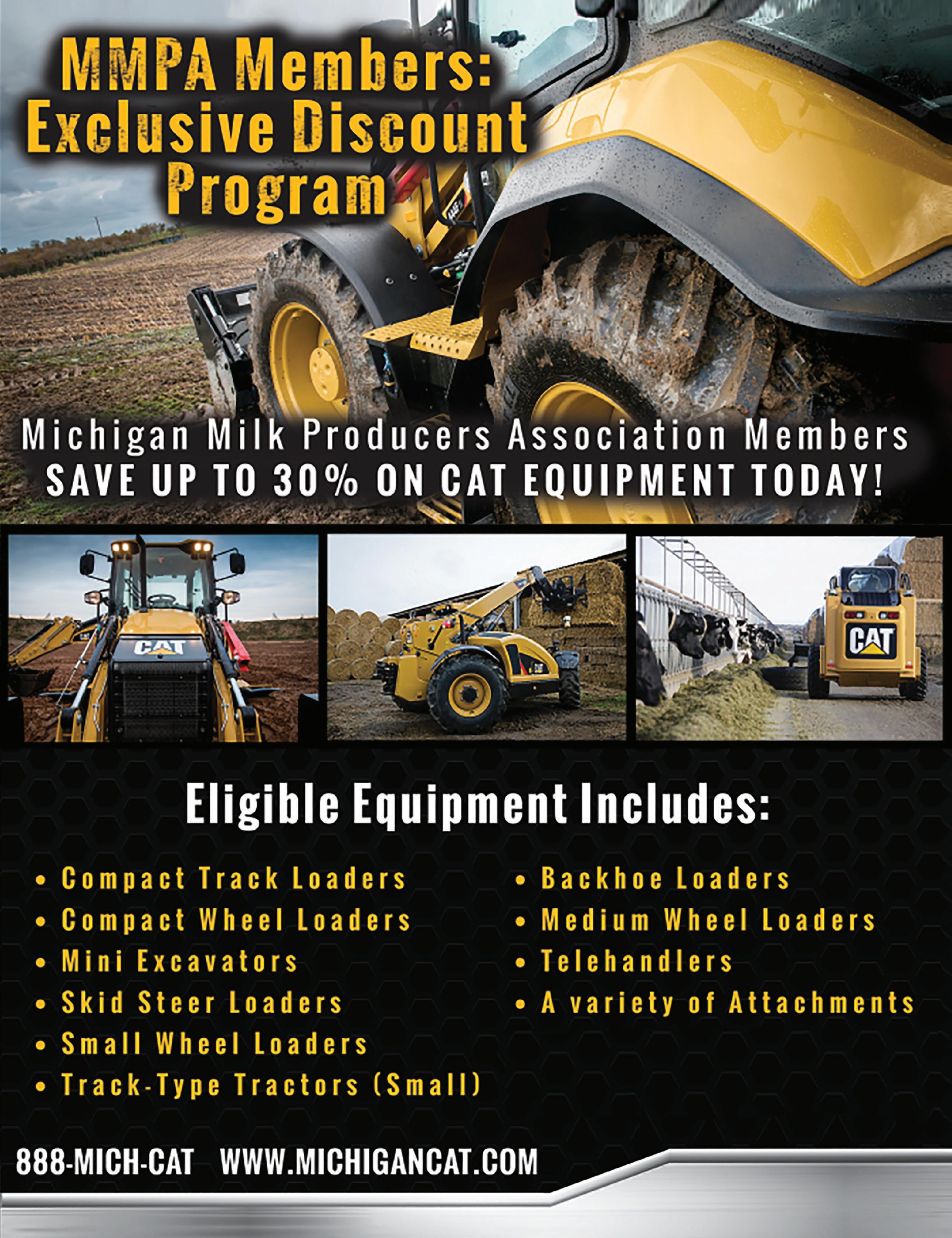

On July 1, 2024, FARM 5.0, the latest FARM Animal Care evaluation will launch and run for three years. The change from FARM 4.0 to FARM 5.0 will not be as significant of a change as we saw moving from 3.0 to 4.0 in 2020. Many of the standards are the same, with minor refinements and clarifications throughout the program to improve consistency in evaluations. The new program standards and those with elevated corrective actions have been made in the spirit of continuous improvement.
As we transition and grow within FARM 5.0, MMPA will help producers with new resources, and we will reach out to our veterinary community to ensure everyone is aware of the changes. By utilizing the FARM program to complete the animal care evaluations required in today’s market, we are taking advantage of a self-governing program that’s created by dairy farmers and industry professionals, not through legislation like some other agriculture sectors. The FARM program also lets us leverage a universal program that’s accepted across the industry, rather than completing a unique program for each customer.
Version 5 of the National Dairy FARM Animal Care Program will go into effect July 1. This is following a 2.5-year review process and including a publicly available open comment period.
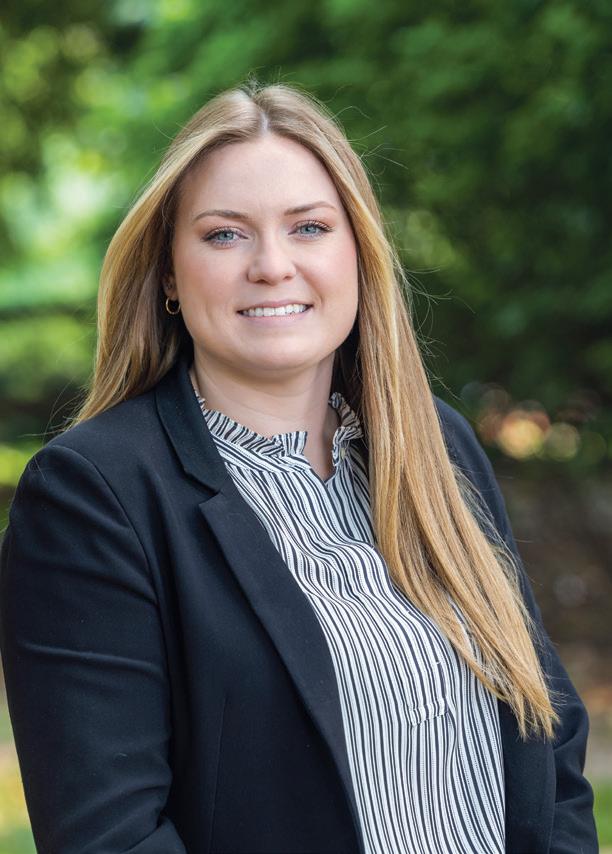

Refinements within this version include:
• Locomotion: Establish a benchmark of no more than 15% moderate lameness
• Disbudding: Update pain management requirement to be met within 9 months (previously 3 years), acceptable methods: Caustic Paste & Cautery
• Calves: Clarify the definition of appropriate timeliness, quantity and quality of colostrum
• Continuing Education: Elevate family employee continuing education standard to be met within 9-month timeline (previously 3 years)
• Euthanasia: Add the identification of a trained secondary individual for euthanasia implementation and confirmation of death in existing euthanasia protocol
• Program Implementation: Establish process for FARM & Participant to support farms that exceed animal observation benchmarks significantly This version of FARM Animal Care will be in effect from July 1, 2024 – June 30, 2027.
More at https://nationaldairyfarm.com/dairyfarm-standards/animal-care/animal-careversion-5-development/.
I serve on the FARM program’s Animal Health & Wellbeing Committee, with 22 other producers and 20 industry professionals including cooperative staff and veterinarians. The process of developing a new FARM version starts with the FARM taskforce who put their recommendations together and collect public comments before the committee I serve on reviews it. After that, the NMPF Board of Directors discusses further recommendations before approving it.
Everyone involved in the process takes time to make sure the changes answer a true question that either consumers or customers are asking about. I know the process works because through committee discussion, regional and herd differences are raised, which gives us an opportunity to take the national differences into consideration and end up with rules that no matter the farm’s size or breed or region can be realistically followed.
As we go into FARM 5.0, I think it’s evident that the FARM program has matured and become an industry standard that is accepted by our customers. The changes in 5.0 are minor in my view, and that’s a result of a solid program in 4.0 that was highly accepted and didn’t require us to rewrite the book.
Kick Off Survey
September-December 2021
Industry Town Hall Meeting
December 2021
NMPF Board of Director Meeting
March 2022
Industry Town Hall Meeting
March 31, 2022
Animal Health & Well-Being Committee Meetings
Quarter 2
Quarter 3
NMPF Board of Directors Meeting
June 2022
Industry Town Hall Meeting
June 30, 2022
Industry Town Hall Meetings
September 8, 2022
December 1, 2022
NMPF Board of Director Meeting
October 2022
Public Commenting Period
September-November 2022
Animal Health & Well-Being Committee Approval
January 2023
NMPF Board of Directors Approval
March 2023
Resource Development
March-December 2023
Industry Town Hall Meeting
April 6, 2023
Version 5 Evaluator Trainings
January-June 2024
Version 5 Implementation
July 1, 2024
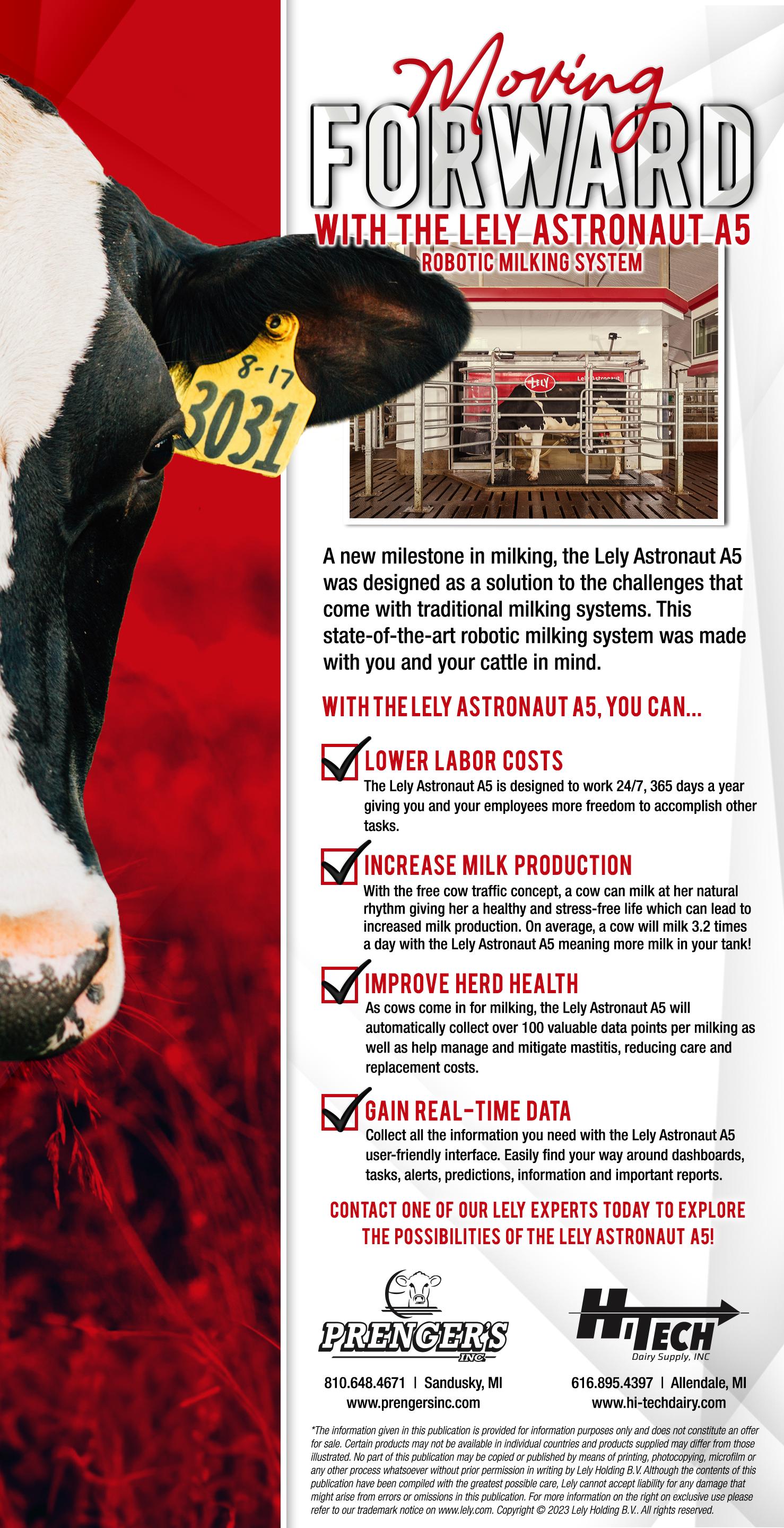
The seventh annual MMPA member photo contest opened on May 1 with submissions due before July 1 . Contest applicants are encouraged to submit photos that are reflective of what encompasses our cooperative and captures a wide variety of the dairy farm lifestyle.
Phone photographers are encouraged to submit entries! First, second and third place will be selected based on composition, quality and character of the image, suitability and/or creativity and overall impression of the photo. People’s Choice and Staff Choice awards will be selected based on public and staff popularity.
For more information and to see last year’s award-winning photos, visit www.mimilk.com/photo-contest
In April, MMPA made cash payments totaling over $4 million in the retirement of 2014 certificates of equity. This is in addition to the nearly $1.6 million in cash patronage from 2023 earnings paid earlier this year. MMPA’s strong financial position allows us to return allocated equities to members on a ten-year revolving basis.
Nearly 100 MMPA members toured the Superior Dairy plant in Canton, Ohio during MMPA’s CORE program held in April. Members toured the plant in small groups, viewing all facets of the plants’ production: plant receiving bays, 96-ounce and caseless gallon bottle blowing, ice cream production, milk loading areas and more. After the tour, MMPA members enjoyed some of the products made at the plant and had the opportunity to ask questions to plant and MMPA leadership.
Following the CORE program, MMPA Young Cooperators enjoyed fellowship at the Pro Football Hall of Fame and toured Kurt Steiner and Paul Keener farms, who both represent Ohio on the MMPA board of directors.
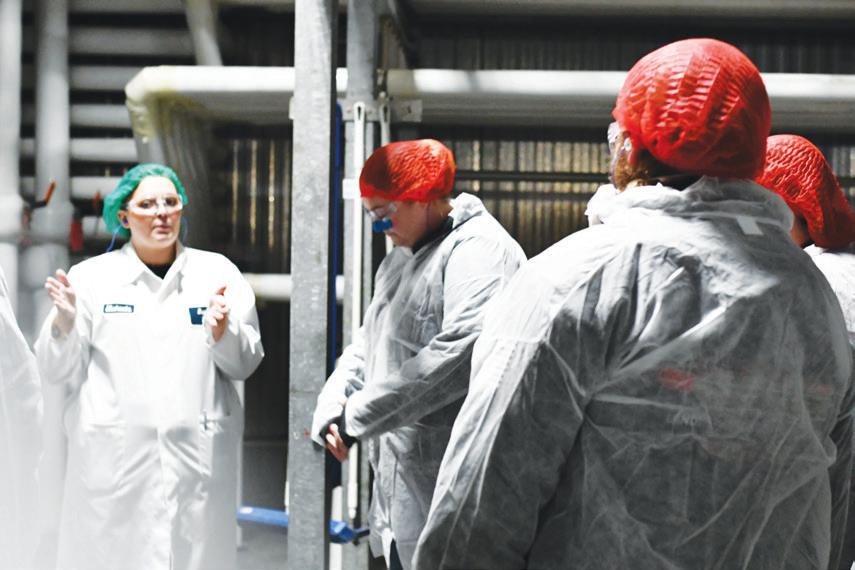
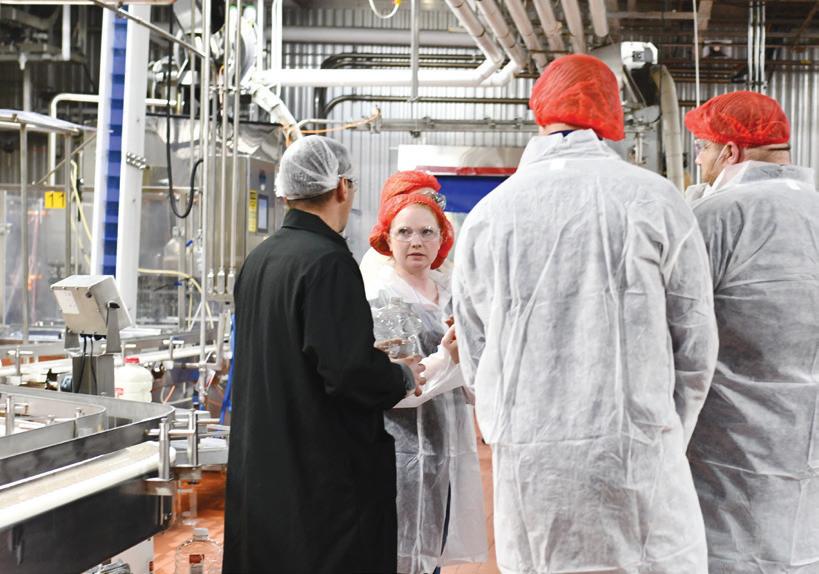
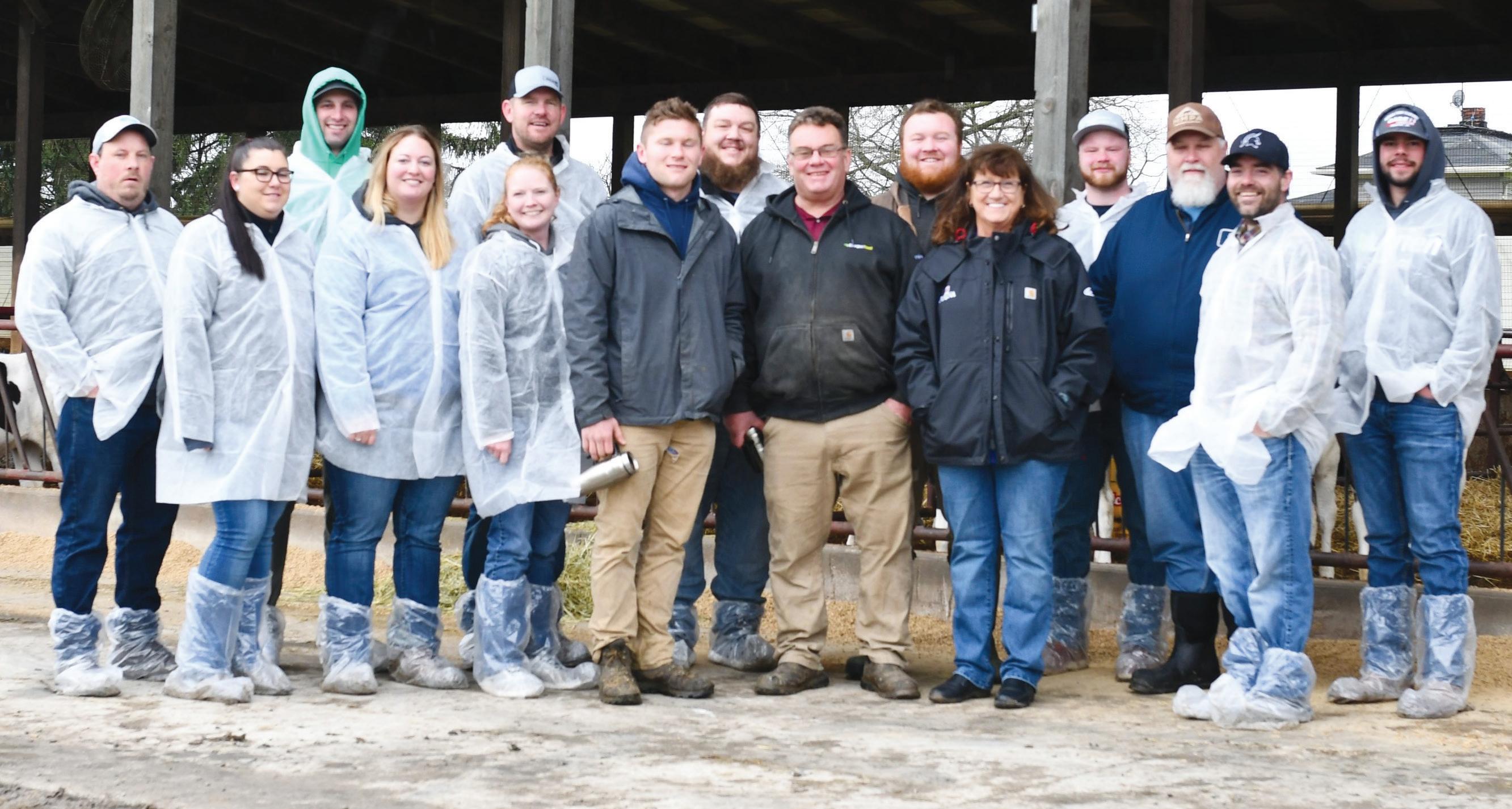
In March, highly pathogenic avian influenza (HPAI) was discovered in dairy herds in Texas. Since then, U.S. Department of Agriculture (USDA) has confirmed HPAI cases in several dairy herds throughout the U.S., including Michigan and Ohio. The USDA, Centers for Disease Control and Prevention (CDC), and Food and Drug Administration (FDA) continue to affirm that milk and dairy products remain safe to consume and the threat to the public remains low. Pasteurization (high heat treatment) kills harmful pathogenic bacteria and other microorganisms, including viruses inclusive of HPAI. Routine testing and wellestablished protocols for U.S. dairy also continue to ensure that only safe milk enters the food supply.
The CDC confirmed that a person who was exposed to dairy cattle in Texas presumed to be infected with HPAI has tested positive for the virus. The patient reported eye redness consistent with conjunctivitis as their only symptom and is recovering. This infection does not change CDC’s human health risk assessment for the public, which the agency considers to be low. There remain no concerns with the safety of the commercial milk supply, as federal agencies have affirmed that pasteurization inactivates bacteria and viruses, like influenza, in milk.
The USDA, CDC, FDA, World Health Organization, and state health authorities all have affirmed the safety of the U.S. commercial milk supply. The federal Grade “A” Pasteurized Milk Ordinance (PMO) is the global standard for milk safety. No milk from cows exposed to HPAI or other illnesses enters the food supply and should milk from any asymptomatic dairy cow enter a processing facility, pasteurization will destroy HPAI as well as other viruses and pathogens. In keeping with PMO, milk from sick cows must be collected separately and is not allowed to enter the food supply chain. This means affected dairy cows are segregated, as is normal practice with any animal health concern, and their milk does not enter the food supply. As an additional layer of security, pasteurization (high heat treatment) kills harmful pathogenic bacteria and other microorganisms, including HPAI and other viruses. Viral fragments detected by lab tests following pasteurization are evidence that the pasteurization process has effectively destroyed HPAI; these fragments have no impact on human health.
Detections of avian influenza in birds, including chickens, are common in the U.S. in the spring and fall due to wild birds spreading the virus as they migrate to and from their seasonal homes. While it is uncommon for HPAI to affect dairy cows, USDA Animal and Plant Health Inspection Service has been tracking detections of HPAI in mammals for many years in the U.S., leading dairy farmers and veterinarians in the U.S. to prepare for this eventuality. Initial testing by the National Veterinary Services Laboratories has not found changes to the HPAI virus in dairy cattle that would make it more transmissible to humans. The risk to humans remains low.
MMPA producers scoring 95 percent or higher on Grade A Surveys and Federal Check Ratings
ANSCHUETZ DAIRY FARM LLC*
MARK R RAMER*
WIEBER DAIRY LLC*
HORNBACHER FARMS*
STARWARD FARM*
DAVID J LEAVINE*
FOLKERSMA FARM LLC*
SHERWIN WILSON*
STEINHURST FARMS LLC
ROBERT L HEROLD TRUST
KIKO FARMS LLC
PERO DAIRY FARMS LLC
E B RIDGE DAIRY LLC #3
DAVID & LISA WARNKE
STONY CREEK DAIRY LLC
ANDREW J FELDPAUSCH
JEREMY BEEBE
BENNETT & SONS DAIRY FARM LLC
RDJ DAIRY
KEITH & EMILY MARTIN
REUBEN D YODER
AARON YODER
VERNON M RABER
JLH-JH FARMS LLC
MARION A MILLER
JEFF HERSHBERGER
MUTTI DAIRY FARMS LLC
RODNEY & LINDA GOEDEL
JOHN D HILL
GERALD & BRENT COTTLE
TAYLOR CREEK FARM LLC
FREIS DAIRY LLC
STANLEY GRZYBOWSKI
OAK RIVER DAIRY LLC
DELCATH FARMS LLC
NUGENT’S FARM DAIRY
ALBERT J GUSA
THUEMMEL DAIRY INC
ROSE VALLEY DAIRY LLC II *100
The National Milk Producers Federation (NMPF) and the International Dairy Foods Association (IDFA) expressed disappointment in the final rule released in April to update the Special Supplemental Nutrition Program for Women, Infants and Children (WIC), which maintained the proposed rule’s cuts to dairy in the WIC food packages. WIC is a vital program ensuring that pregnant women, new mothers, infants, and children have access to key nutrients that may be lacking in their diets, so decreasing the amount of dairy decreases the nutrients they are accessing through it.
“NMPF is disturbed by the decision to reduce access to the essential nutrients dairy adds to the diet,” said Gregg Doud, NMPF president and CEO. “Nutrition science demonstrates that dairy products like milk, yogurt and cheese are especially important for women, infants, and children; meanwhile, nearly 90% of Americans
don’t meet the number of dairy servings recommended by the 2020-2025 Dietary Guidelines for Americans. This rule works against the WIC Program’s goal of ensuring all Americans have consistent and equitable access to healthy, safe, and affordable foods.”
Milk, cheese, and yogurt are three of the five top redeemed items through WIC. They also provide three of the four nutrients of public health concern identified in the 2020 guidelines.
“At a time of rising food costs, it’s important to focus on increasing access to a wide variety of healthful, nutrient-dense, and affordable foods, including dairy products,” Doud said. “It’s disappointing that the final rule limits WIC family purchasing power for nutritious dairy foods.”
While disappointed in the cuts to the dairy allotments in the WIC packages, NMPF and IDFA appreciate the rule’s requirement that states offer lactose-free

milk and a wider selection of product package sizes. These changes will help make dairy products more accessible for all WIC participants.
Speaking for IDFA, President and CEO Michael Dykes, D.V.M., said, “This final rule cuts the amount of milk that can be purchased by up to 3 gallons per family per month at a time of high food prices, stubborn inflation, and rising hunger rates, and harms nutrition security by disregarding the Dietary Guidelines’ findings that dairy items in the WIC food package are under-consumed. IDFA has polled WIC participants and 35% say they will need to use non-WIC funds to cover purchases of milk and dairy due to these cuts. Another 33% say the cuts will make their shopping for milk and dairy products harder. Some may decide not to reenroll in WIC because of the cuts. Partners like state WIC agencies, local health clinics, and anti-hunger groups will be forced to explain USDA’s WIC cuts to 6 million low-income mothers and children under the age of five.
“We do, however, recognize and appreciate how the final rule authorizes purchases of lactose-free milk and offers new flexibilities for yogurt and cheese that make it easier for WIC participants to access nutritious dairy foods that meet their family’s dietary needs. For example, IDFA has worked for many years to create flexibility what allows WIC participants to swap a portion of their milk allotment for reasonably sized portions of yogurt (such as 4 oz., 5.3 oz., and 6 oz. cups) totaling up to 32 ounces, rather than one 32-ounce tub. With that change in place, WIC participants will have greater access to a nutrient-dense food tha t helps participants meet the program’s nutrient recommendations. We look forward to the opportunity to collaborate with USDA to encourage states to fully utilize the rule’s provisions that expand options for yogurt and cheese, and to mitigate the cuts to milk benefits,” said Dykes.
USDA announced long-awaited updates to its school nutrition standards in late April. Importantly, the final rule solidifies the ability of schools to offer low-fat (1%) and fatfree flavored milk in school meals for children of all ages, a victory that will encourage consumption of the essential nutrients provided by dairy.
NMPF’s persistent advocacy efforts secured significant victories for dairy farmers and their cooperatives under the new rule. A combination of targeted legislative work and thorough regulatory feedback ensured the long-term availability of low-fat flavored milk, reasonable standards governing sodium in school meals and continued strict nutritional equivalence requirements for plant-based alternatives. Below are a few key takeaways from the announcement.
USDA’s final rule allows schools to serve low-fat (1%) and fat-free flavored milk to students at all grade levels. The agency’s proposed rule last year sought stakeholder comment on whether flavored milk should be permitted for students at all grade levels or only for high school students. NMPF pushed for the first option with grassroots and congressional support, and prevailed.
NMPF worked for a dozen years to reverse a 2012 rule that removed low-fat flavored milk by providing feedback through the regulatory process, drafting and building bipartisan support for legislation, drafting and circulating congressional letters, providing short-term fixes through the USDA appropriations process and working with members of Congress to press the issue during USDA hearings. These efforts led to strong bipartisan and multi-stakeholder support for expanded options.
NMPF continues its work to further advance school milk choices through the Whole Milk for Healthy Kids Act, which would allow both unflavored and flavored whole and 2% milk to be offered in school cafeterias.
NMPF argued against easing the qualification criteria for plant-based alternatives, as most do not meet nutritional equivalence standards.
USDA’s final rule maintains stringent nutritional equivalence standards for dairy alternatives. While the terminology for measuring vitamins A and D aligns with current standards, their quantities remain unaltered. In comments to USDA, NMPF argued against easing the qualification criteria for plant-based alternatives, as most do not meet nutritional equivalence standards.
The final rule includes sodium limits on school meals that will not be more restrictive than the Target 2 limits from the 2012 school meals rule, a compromise that NMPF supports.
Sodium plays many roles in the manufacturing process for several dairy products, and affects both product safety and product quality.
USDA’s initial proposal suggested a 20 percent reduction in total sodium for school breakfasts and a 30 percent reduction for school lunches beginning in the 2025-26 school year and incrementally decreasing by 10 percent every other year. However, NMPF worked with Congress to prevent the implementation of this change. As a result, the current sodium limits will persist until the summer of 2027. Subsequently, for the 2027-2028 academic year, schools will be required to enact a 10 percent reduction for breakfasts and a 15 percent reduction for lunches.
NMPF continues its work to further advance school milk choices through the Whole Milk for Healthy Kids Act, which would allow both unflavored and flavored whole and 2% milk to be offered in school cafeterias.
As anticipated, the rule introduces new restrictions on added sugars. Starting from the 2025-2026 school year, flavored milk must contain no more than 10 grams of added sugars per 8 fluid ounces (or 15 grams per 12 ounces for a la carte in upper grades). Thanks to the efforts of many NMPF member cooperatives, the level of added sugar in flavored milk typically already falls below this maximum. Additionally, beginning in the 2025-2026 school year, yogurt must contain no more than 12 grams of added sugars per six ounces. By the 2027-2028 school year, added sugars in school meals under the National School Lunch Program and School Breakfast Program must not exceed 10 percent of total calories, calculated on a weekly average basis rather than per individual meal.
PROVIDED BY THE NATIONAL MILK PRODUCERS FEDERATION
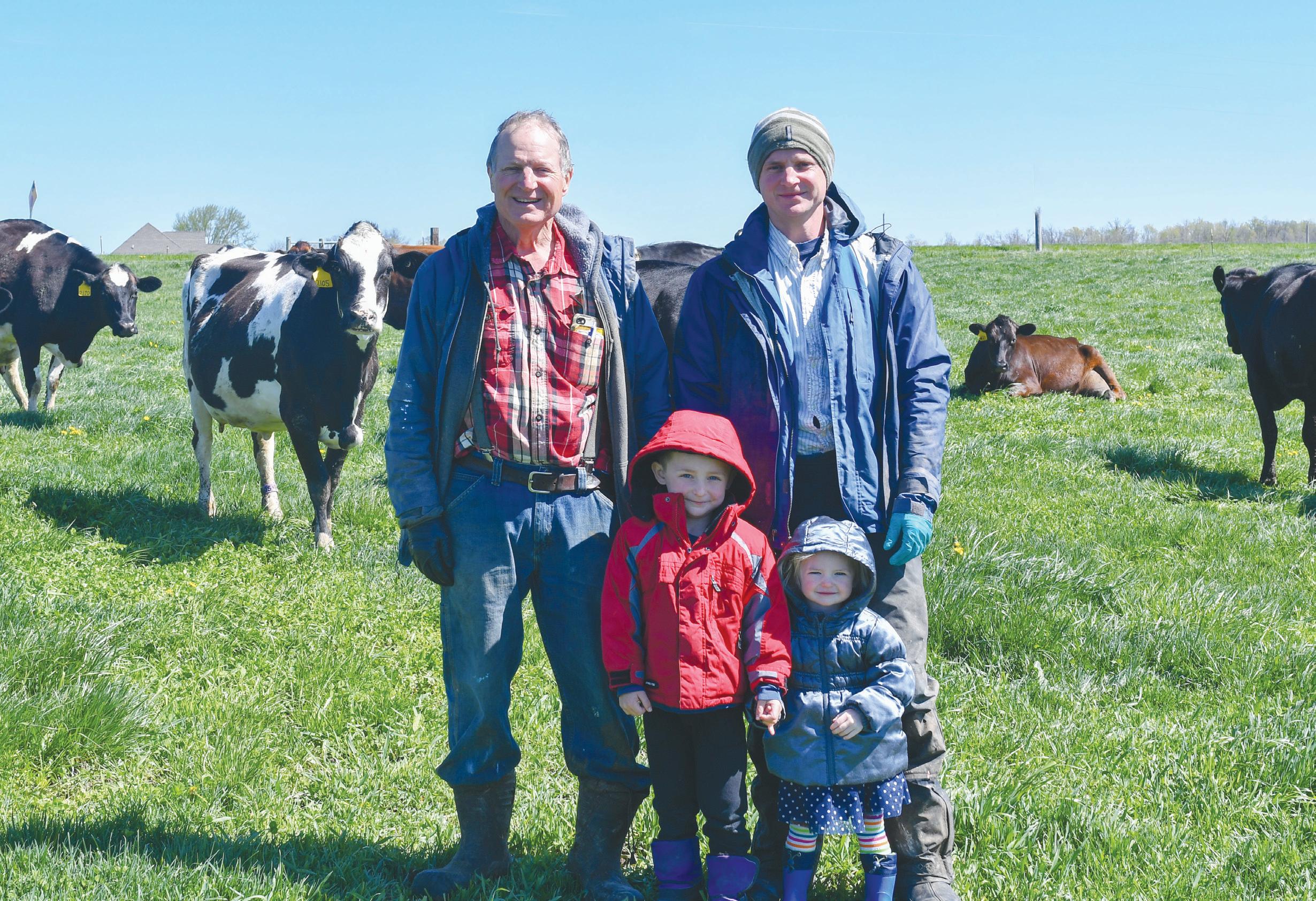
MMPA IS COMMITTED TO COOPERATIVE SOCIAL RESPONSIBILITY AND SUSTAINABLE BUSINESS PRACTICES THROUGHOUT OUR ENTIRE SUPPLY CHAIN. AT THE FARM LEVEL, MMPA MEMBERS ARE ALSO ON A SUSTAINABILITY JOURNEY. WE’RE CHECKING IN WITH A HANDFUL OF MEMBER FARMERS LEADING THE CHARGE WITH THIS SUSTAINABILITY SPOTLIGHT SERIES.
It is all about the health of the soil for dairyman Mike Martin, who grazes 400 New Zealand Fresian Jersey crossbred cows on 170 acres of pasture in Wakarusa, Indiana. “To me sustainability and the health of the soil are very similar, from what I’ve learned is that having something green and growing on the soil is very healthy for its biology.”
Wakiana Dairy, a combination of Wakarusa and Indiana, began in 1984 when Mike and his wife Sue moved to the farm and started with 24 milking cows. Over time the couple expanded the operation and passed on their passion for farming to their son Ben, who works full-time on the farm.
Their mission is to, “Run a business that honors God by operating with integrity and honesty, producing healthy food for people, and using farming practices that are sustainable from generation to generation.”
For the Martins, the soil, cattle, and financial advantages are the primary
The soil thrives when it’s covered in grass and is grazed. Being out in the grass and grazing is healthier for the cattle. The grass is our cheapest and highest quality forage, therefore helps cut our cost of production.”
components of their system, each complementing the others to facilitate the seamless functioning of the operation. “The soil thrives when it’s covered in grass and is grazed. Being out in the grass and grazing is healthier for the cattle. The grass is our cheapest and highest quality forage, therefore helps cut our cost of production.”
Their system begins with the soil. “We follow the growth of the grass. The growth of the grass is measured using a rising plate meter every 7-10 days, and the information from the meter is plugged into a spread sheet, from the University of Missouri, to track the growth rate of the pastures.” Cows are rotated to a new pasture twice a day, and fed baleage and a grain mix at the bunk as needed.
If pastures need to be seeded, a no till drill is used to sow a pasture seed mix. Mike explains, “I opt for Italian ryegrass as its very fast establishing, perennial rye grass for its high energy content, and clover because it grows well in the summer. Thanks to our high stocking rate, we only purchase a small amount of nitrogen fertilizer for the pasture.”
The Martins are also focusing on soil health by recently integrating an irrigation system. “In 2012, after a drought, we put in center pivots. In the summer when the pastures are dry, we
give it water, and grass loves water.”
Ben explains, “If you over apply then the ground gets too soft then the cows tear it up. We’re motivated to keep plenty of water for the grass to grow but not so much that it makes a mess, and costs more to run.” Plans are in the works to install water sensors that will provide feedback on moisture levels in the soil, allowing for more precision when making irrigation decisions.
They’re not just efficiently utilizing water; they’re also ensuring it remains within the soil, rather than flowing through the tile system. “It has taken us five years to gain 1% of organic matter in the soil and we are up to 5% organic matter today. When you have high organic matter soils you’re holding a lot more water in your soil, and that’s also holding your nutrients instead of washing them out,” Mike said. The Martins estimate that they have essentially zero erosion due to their diligence towards soil health.
“It is amazing what grass can do.”
Mike is pleased with not only the quality of his soil but also in the welfare
of his cows. “I am impressed with how long cows on grass can remain productive. Currently, we have 90 out of 400 cows over eight years of age. The cows last a long time and their milk and meat have a better nutrient profile, and so it is healthier for people to consume when the cattle are grazing. There is a better ratio of omega 3 to omega 6 fatty acids.”
To maintain economic stability in a volatile market, the Martins focus on keeping costs low. “We cannot control the price of milk, but we can focus on keeping costs low enough. That’s why there are no big barns here. We utilize the acreage we have to feed and house our animals.”
Mike’s advice to other producers is to, “Learn to think differently and beyond yourself. Sustainability is not just doing the same thing again and again; we must consider what is best for the future of the land. That’s what motivates me. I’m not going to be here forever, but I can do my part for as long as I am here to help things be sustainable.”
NO TILL DRILL: FARMERS USE A NO-TILL DRILL TO PLANT IN FIELDS THAT THEY DON’T TILL. THE SPECIAL NO-TILL DRILL CREATES A CHANNEL THAT IS JUST SPACIOUS ENOUGH FOR SEEDS TO BE PLANTED, MINIMIZING SOIL DISTURBANCE. NO-TILL PRACTICES CAN MINIMIZE WIND AND WATER EROSION AND PROTECT SOIL FROM HIGH TEMPERATURES AND MOISTURE LOSS. IN ADDITION, ORGANIC MATTER FROM PREVIOUS CROPS ENRICHES THE UNTILLED SOIL.
RISING PLATE METER: A RISING PLATE METER IS A MEASUREMENT TOOL TO ESTIMATE THE APPROXIMATE FORAGE AVAILABLE IN A PASTURE. IT’S MORE ACCURATE THAN JUST MEASURING PASTURE HEIGHT, BECAUSE IT TAKES INTO ACCOUNT THE DENSITY OF THE PASTURE.
CENTER PIVOT IRRIGATION: A SELF-PROPELLED IRRIGATION SYSTEM IN WHICH A SINGLE PIPELINE SUPPORTED ON TOWERS ROTATES AROUND A CENTRAL POINT. THESE SYSTEMS ARE TYPICALLY ABOUT ONE QUARTER MILE LONG AND SERVE 128-TO 132-ACRE CIRCULAR FIELDS.
SOURCE: U.S. DEPARTMENT OF AGRICULTURE
MMPA sustainability survey, FARM* Animal Care and FARM* Environmental Stewardship evaluations.
MMPA SUSTAINABILITY MISSION
To continually strive for a more sustainable future for our community, our environment, our economy’s health, and for the lives and world around us.
MSU students pursuing dairy industry-related programs of study r eceive Michigan Dairy Memorial Scholarship Foundation awards
EAST LANSING, Mich . – The Michigan Dairy Memorial and Scholarship Foundation awarded $158,000 in scholarships to Michigan State University (MSU) students pursuing dairy industry-related programs of study for the 2023-24 academic year. The following students were awarded a named Michigan Dairy Memorial and Scholarship Foundation Scholarship. Named scholarships are established endowments within the MDMSF that each have specific criteria related to the individual the scholarship is named after. The named scholarship recipients include :
Glenn & Anne Lake Scholarship, $8,500: Drew Neyer, a senior in Animal Science from Shepherd, MI
Russel Erickson Scholarship, $6,000: Katie Wilson, a senior in Animal Science with an Agribusiness Management minor from Blanchard, MI
Donald and Valera Murray Scholarship, $5,000: Brianna Hill, a junior in Animal Science from Gregory, MI
John and Barbara Dilland Scholarship, $5,000: Rachael Bosse, a senior in Animal Science from Wayland, MI
John and Barbara Dilland Scholarship, $5,000: Lauren Ringewold, a junior in Animal Science from Battle Creek, MI
Archie Studer Scholarship, $5,000 : Irie Moussiaux, a senior in Animal Science from Almont, MI
Nick Bellows Scholarship, $5,000: Jaylin Dilsaver, Animal Science sophomore from Decker, MI
George and Shirley Hazle Scholarship, $5,000: Adalee Thelen, a senior in Animal Science with an Agribusiness Management minor from St. Johns, MI
Red and Edna Cotter Scholarship, $5,000: Curtis Patton, a third-year student in Veterinary Medicine from Spraggs, PA
Harold and Lillian Gremel Scholarship, $5,000: Morgan Mathews, a third-year student in Veterinary Medicine from Glencoe, MN
Velmar Green Scholarship, $5,000: Rhianna Bruursema, a second-year student in Ag Tech Dairy Management from West Olive, MI
Gary and Carolyn Trimner Scholarship, $5,000: Cecelia Brandt, a second-year student in Veterinary Medicine from Cedar Springs, MI
The following MSU students were awarded $3,500 scholarships from the Michigan Dairy Memorial and Scholarship Foundation:
Katrina Beaton, a second-year student in Veterinary Medicine from Traverse City, MI
Ella Cloud-Schneider , a junior in Animal Science from Midland, MI
Mason Fielding, a sophomore in Animal Science from Ottawa Lake, MI
Deandra Franklin, a junior in Animal Science from Brownstown, MI
Lane Herrman, a senior in Animal Science from Buchanan, MI
James Link, a sophomore in Animal Science from Alto, MI
Jewel McMaster, a senior in Animal Science from Leonidas, MI
Clea Moore, a junior in Animal Science from Fowler, MI
Danielle Rummel, a senior in Animal Science from Frankenmuth, MI
Samantha Whitehead, a senior in Animal Science from Corunna, MI
The following first-year students were awarded the Michigan Dairy Memorial and Scholarship Foundation First-Year Scholarship, worth $3,000:
Brianna Armbruster, a junior in Animal Science from Elkton, MI
Julia Baker, a freshman in Animal Science from Lansing, MI
Riley Baker, a junior in Animal Science from Coldwater, MI
Sadie Brearley, a freshman in Animal Science from Ionia, MI
Grace Brown, a freshman in Animal Science from Reese, MI
Bette Eggink, a freshman in Animal Science from Deckerville, MI
Grant Gasper, a freshman in Ag Tech Dairy Management from Lowell, MI
Hailey Greimel, a freshman in Food Science from Charlevoix, MI
Brielle Herner, a sophomore in Ag Tech Agricultural Operations from Pinconning, MI
Erica Holup, a freshman in Animal Science from Ottawa Lake, MI
Amy Kern, a freshman in Ag Tech Agricultural Operations from Frankenmuth, MI
Meta Keyes, a freshman in Ag Tech Dairy Management from Montrose, MI
Callie Loew, a freshman in Animal Science from Byron Center, MI
Isabella Stoutenburg, a sophomore in Animal Science from Sandusky, MI
Cole Vander Dussen, a freshman in Ag Tech Dairy Management from Richland, MI
One first-year student was awarded a Recruiting Scholarship worth $15,000:
Elizabeth Hyman, a sophomore in Animal Science from Adams, NY
Thanks to the generous support of donors, the Michigan Dairy Memorial and Scholarship Foundation oversees the second-largest scholarship program in the MSU College of Agriculture and Natural Resources. The MDMSF was established in 1957 through contributions made in honor of individuals who have served the dairy industry. Income from the endowment has generated scholarships for deserving students who want to pursue careers associated with the dairy industry. For information on making contributions to honor members of the dairy industry or to support student scholarships, please contact the MSU College of Agriculture and Natural Resources External Relations at 517-355-0284. To learn more about the Michigan Dairy Memorial and Scholarship Foundation, contact Dr. Miriam Weber Nielsen in the MSU Department of Animal Science at 517-432-5443.

MMPA members recently elected Paul Keener to serve a threeyear term on the MMPA board of directors as a District 1 Director. Keener joins the 12 other dairy farmers on the MMPA board of directors, helping guide the direction of the cooperative and setting strategic goals.
Rosedale Farms LLC, established in 2012 in Ashland, Ohio, has been operational for over a decade. Paul, together with his wife Shyann and their three children, manage 607 acres of farmland and 650 milking cows on their dairy. He became an active member in MMPA when Superior Dairy was acquired in 2021 and is looking forward to providing his insights on the board of directors.
How has MMPA impacted your farm?
MMPA impacts my farm with the quality bonus that they offer. It gives me an incentive to work hard to achieve better milk quality. Although we still have room for improvement, it has changed what we’ve been focusing on to achieve quality milk. After visiting the Superior Dairy plant as part of MMPA’s CORE program, I’ve seen first-hand how our quality milk gets processed and its significance. It brought home the fact that we need to do our part on the farm to produce quality milk.
What do you value most about MMPA?
It’s a farmer owned co-op that provides a secure, competitive marketplace.
Why did you want to join the board of directors?
It’s an honor to be on the board. I want to be on the board of directors to help continue the growth of MMPA. It’s an exciting co-op and is going to continue to grow and evolve. I will do my best to be a voice for the members while on the board.
What are your goals and vision while serving on the board of directors?
To continue to be a strong co-op for the members, as well as continually growing and improving in a responsible manner to best serve its members.
What would you tell members looking to become more active within the cooperative?
It’s your co-op, be active and let your voice be heard. Decisions will be made whether or not you participate, so it’s important to remain actively involved.
The U.S. Department of Agriculture (USDA) has confirmed Highly Pathogenic Avian Influenza cases in several dairy herds throughout the U.S. While it is uncommon for HPAI to affect dairy cows, USDA Animal and Plant Health Inspection Service has been tracking detections of HPAI in mammals for many years, leading dairy farmers and veterinarians to prepare for this eventuality.
Implementing biosecurity measures is essential to safeguarding dairy farms from the threat of HPAI.
Here are ten biosecurity tips for dairy farms, emphasizing the importance of protecting cattle and their environment from potential sources of HPAI infection.

Movement of animals on and off the dairy can introduce disease to the home herd unless prevention steps are put in place. Take premovement testing of milk samples from lactating cows and nasal swabs for nonlactating cattle by PCR for Influenza A and H5 virus and submit to a National Animal Health Laboratory Network laboratory. USDA is reimbursing all premovement HPAI tests. When moving cattle, keep record of movement using an animal movement log.

Separate all new or returning animals for a minimum of 21 days. Whenever possible, quarantined animals should not share confined air space, panels/fence lines, feeding or watering space with other animals on the farm. Dedicate caretakers and equipment to these animals or work with them last, followed by cleaning of equipment, boots, clothing, etc.
Disrupt habitats like shelter, food and water sources that may attract birds and small mammals.
Limit cattle contact to individuals who are essential for a dairy’s health and continued operation. Require or provide clean clothing and footwear to anyone entering the farm. Do not allow drivers (milk haulers, etc.) access to animal housing, animals or milk products to be fed to calves. Keep track of farm visitors by using a visitor log.
Limit the movement of vehicles on and off the premises and establish dedicated routes for vehicles that do come onto the farm. Implement and communicate designated hauling routes on-farm for milk, feed, rendering and delivery trucks. Use biosecurity signs to regulate traffic on and off your farm and use a vehicle/equipment entry and delivery log to keep track of vehicles entering and exiting your farm premise. Use trailers to transport only your own livestock and clean using an EPA-registered disinfectant effective against HPAI to disinfect trailer interiors that were used to haul cattle.
Use EPA-registered disinfectants on contact surfaces (footwear, tires, etc.) before entry in and out of milking areas and other cattle areas. Require disinfection of handling, treatment, milk sampling/testing, breeding and hoof trimming equipment, with particular attention to proper disinfection of milking equipment.
Dairy workers should limit contact with other livestock and poultry premises, including livestock and poultry the worker may own. Provide hand-washing stations and disposable gloves, and encourage their use.
Follow good milking practices, with special attention to mammary health. Sanitize milking equipment after use with quarantined animals and after sick cattle.
Move animals with clinical signs to a dedicated hospital or sick pen. Whenever possible, this area should not share confined air space, panels/ fence lines, feeding or watering space with other animals. Dedicate caretakers and equipment to sick animals or work with them last, followed by cleaning of equipment, boots, clothing, etc.
Feed only heat-treated colostrum and pasteurized milk and milk products to calves and other farm animals, including cats and other mammals.
Never use untreated surface water as a source for drinking, to wet down barn or paddock areas animals frequent, in barn misters or to clean equipment that contacts dairy cattle. Fence off ponds and non-draining areas. Consult a wildlife or wetlands professional about managing ponds and drainage areas on farm.


On April 12, 2024, Michigan State University (MSU) initiated construction on their new MSU Dairy Cattle Teaching and Research Center. This $75 million endeavor marks a pivotal step forward, enabling researchers, students, and staff to embark on more ambitious ventures than ever before. The expansion of the dairy facility underscores the university’s commitment to fostering diverse research initiatives, while simultaneously enhancing the educational journey for students.
Dr. Barry Bradford, Professor in the Department of Animal Science and C. E. Meadows Endowed Chair in Dairy Management and Nutrition, explained “There has been a lot of discussion here on the farm’s design, and there are no absolute right or wrong answers. When considering all the trade-offs, we ended up making decisions that we feel will be most beneficial to the industry.”
Dr. Bradford is one of three faculty leads, alongside Annette O’Conner, Chairperson of the Department of Large Animal Clinical Sciences and Professor of Epidemiology, and Wei Liao, Professor in the Department of Biosystems & Agricultural Engineering.
The MSU dairy currently milks 220 dairy cows and supports the research of faculty in the colleges of Agriculture and Natural Resources and Veterinary Medicine. With the expansion, the new dairy will have the capacity to hold 688 cows. There will be 32 tie stalls and around 550 milking cows. According to the timeline, the aim is to have cows producing milk in the new facility by the end of 2025. The main cow barn features a double twelve parallel parlor, two robotic milkers, twelve-cow pens for management research, and automated feed bins to feed specific diets and measure feed intake of 96 individual cows in freestall pens.
“There is nothing on Earth that you can build once and it’s going to serve you forever,” states Dr. Bradford. “We provide a lot of solutions within
reproduction and genetics, nutrition, etc. and if we don’t reinvest in the facility that lets us do that research, it disappears. Now we can continue and grow in those areas of strength research-wise to answer questions about the best way to do things in those spaces.”
The capacity for expansion creates opportunities for greater learning and research opportunities. More than doubling the herd size not only accommodates more research projects but also introduces new technology for enhanced data collection accuracy. MSU has never before utilized replicated pens to observe animal groups, despite many instances where it can be beneficial to study a group opposed to individual cows. Another exciting feature is the automated feed bins that give researchers the ease to precisely evaluate the cow’s feed intake. The two robotic milkers are another key area of research and learning opportunity where students can study the variations between a free flow or managed flow system. There is also additional space near the parlor for veterinary students to practice surgeries and cattle evaluations.
“The dairy industry has advanced well beyond the center’s current capacity, particularly in regard to research potential and teaching modern production practices,” said Doug Freeman, interim dean of the College of Veterinary Medicine. “As we train
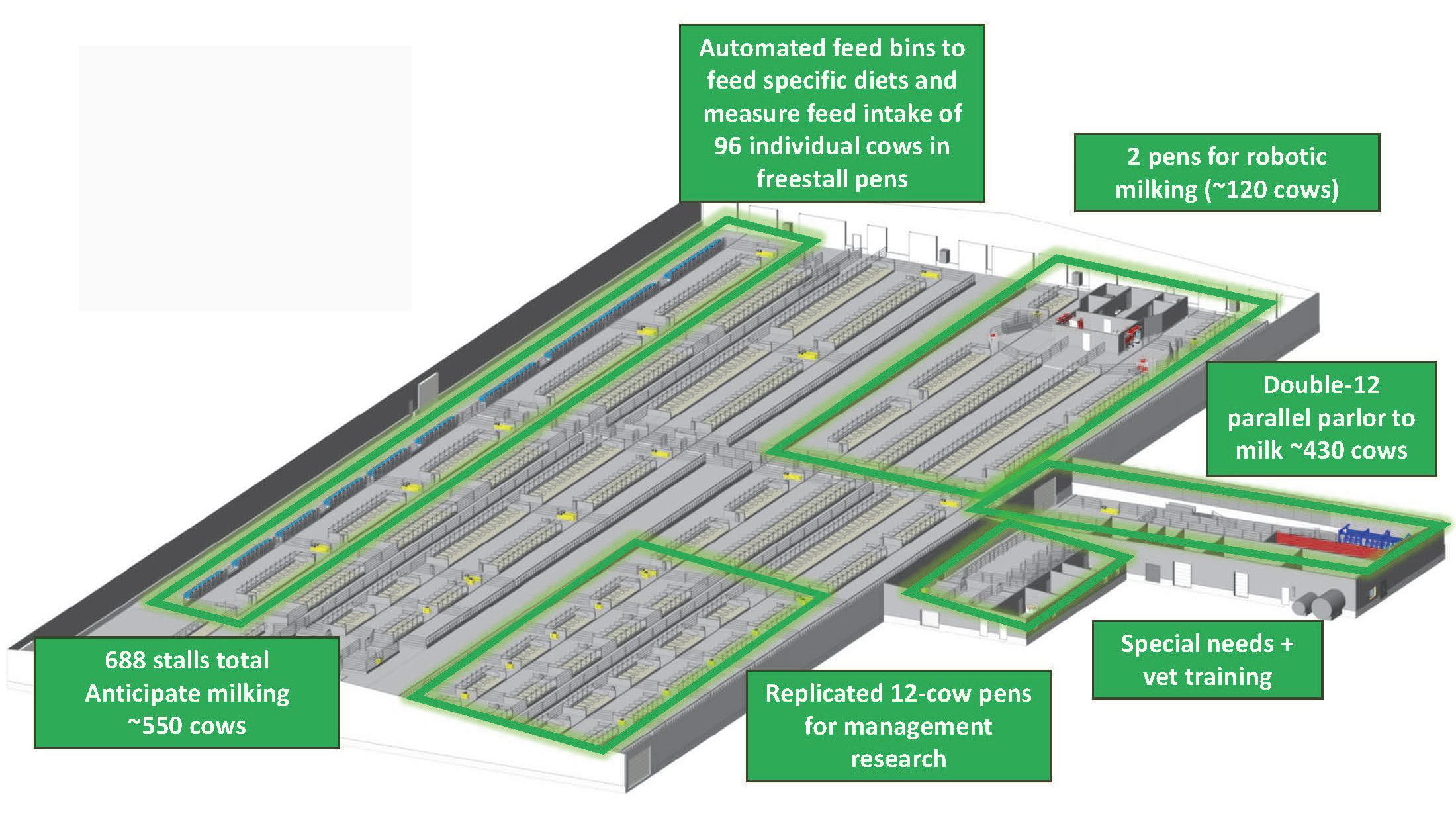

the next generation of veterinarians, the center will allow them to develop significantly enhanced skills in dairy production medicine, which will enable them to serve clients and better protect local and global food systems.”
The visitor center boasts expansive glass windows, providing an up-close view of cows in the parallel parlor. Additionally, the main building includes classrooms for 80 students, a conference room, laboratory spaces, work areas for graduate students, staff offices, and locker rooms.
The dairy plans to offer public tours for observing its operations. Some parts of the old facility, such as the feed storage area, the digester, and one of the cow barns, will continue to be utilized.
“This cutting-edge facility isn’t just modern,” Dr. Conner said. “It’s a testament to how we can commit to aligning our teaching programs and our research programs with the industries that we are seeking to serve.”
The University hopes to attract the attention of students with an interest in dairy to the brand new facilities and expansive learning center. “Having a nice, safe facility for students to work in will hopefully draw talented people who have an interest in dairy,” Dr. Bradford said. “This will have a direct impact on Michigan’s dairy industry as most producers recognize that if we’re only hiring people that grew up on dairy farms, we will be short of employees. We have to find ways to make this an attractive career path for people that are not from farms.”
Not only will the new dairy impact the industry by recruiting more talent into

the field, but it will also be a facility unlike anything in the country. “I like to focus on holistic sustainability. People hear sustainability and, instantly think of environmental impacts, and that’s a part of it. But with this new facility, we can build a strong program around finding the best ways to minimize environmental footprint of dairy production while doing it in a profitable manner, and in a way that lets us get along with our neighbors. The design of our new research facility allows us to do all of that, making it one of the few places in the world that will have it all together in one place,” explains Dr. Bradford.
This project wouldn’t have happened without the support of many partners. MMPA played a role in supporting the building of the new dairy. Dr. Bradford shared, “The reason the Michigan legislature supported this is because MMPA and over 50 other agriculture organizations collectively got behind the need for a new dairy.”
With support from partners like MMPA, MSU is able to continue to share their vision for excellence in sustainability and the circular agricultural economy.
“This new dairy facility will stand as a testament to the power of partnerships,” said Kelly Millenbah, dean of the College of Agriculture and Natural Resources. “These spaces for research, education and outreach will serve Michigan’s farmers and develop tomorrow’s workforce, and we’re so grateful for this investment in thefuture of agriculture at Michigan State.”

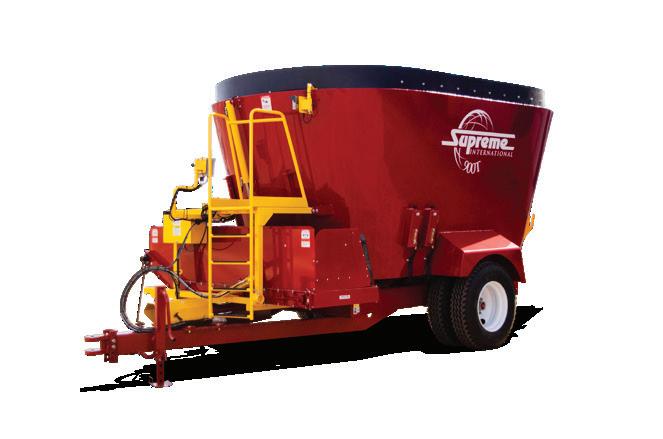
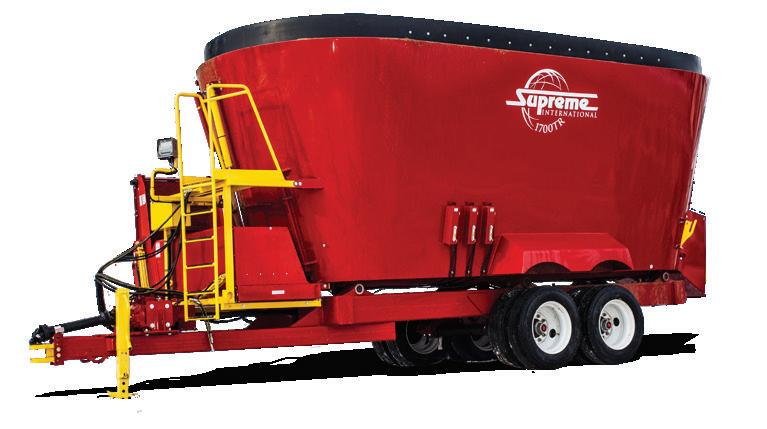


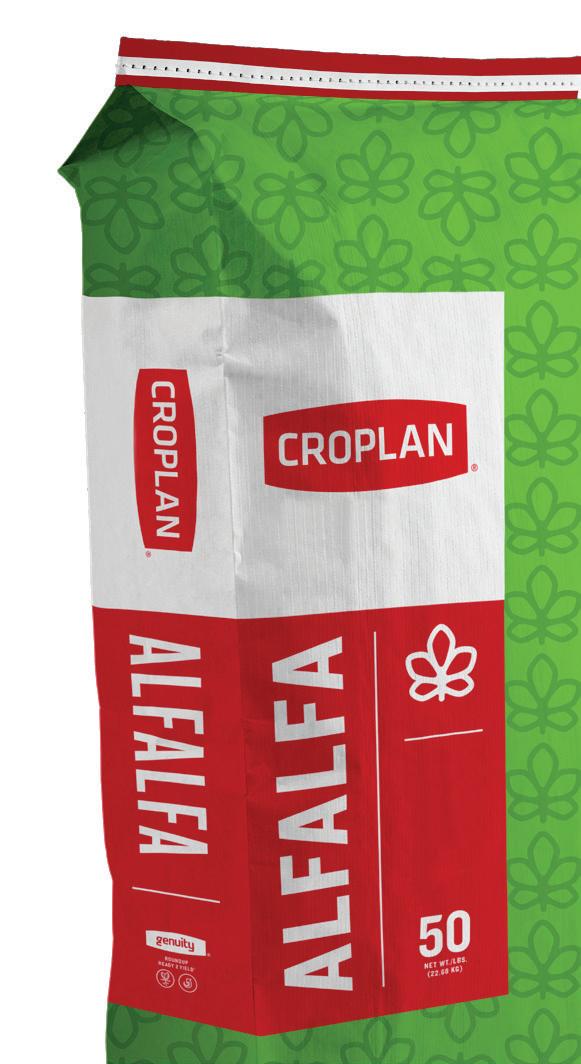
MMPA FARMER-OWNERS ARE THE CORE OF THE COOPERATIVE, AND THEIR VOICES RESONATE IN EVERY DECISION WE MAKE!

This year MMPA has hosted five CORE programs:
1. MMPA 101
2. Sustainability Summit
3. Legislative Update
4. Superior Dairy Tour
5. Price Protection Program
Through the CORE program, members have deepened their understanding of our cooperative, tackled the intricacies of milk marketing, and fostered strong bonds with peers, industry partners and MMPA leadership.
Aligned with our cooperative principle of emphasizing “education, training, and information,” CORE has been a beacon of learning and empowerment. From tailored sessions for members to spreading the word about the cooperative advantage, we’ve embraced knowledge-sharing and advancement every step of the way.
We’re thrilled with the program’s success so far and look forward to the next ones!

MMPA 101
FEBRUARY 1, 2024
Attendees learned more about how MMPA markets milk as a dairy cooperative and toured the Novi laboratory. They heard from MMPA President & CEO Joe Diglio, MMPA Board Chairman Doug Chapin and members of the MMPA team on:
• MMPA’s evolution
• cooperatives and the role of the Board of Directors
• MMPA’s manufacturing plants,
• MMPA products and customers,
• milk pricing
• member services
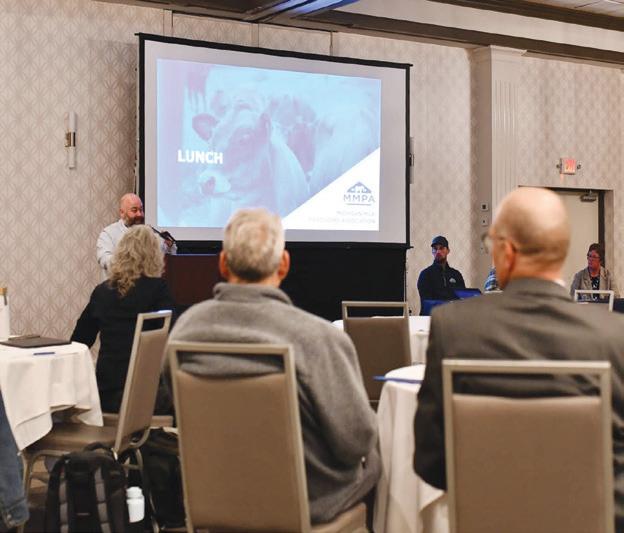
FEBRUARY 28, 2024
Attendees learned more about MMPA’s sustainability program and efforts. They heard from MMPA’s customers and partners about:
• the importance of sustainability for their organizations
• sustainability programs they partner with MMPA on
• the role of carbon markets in the sustainability landscape

At MMPA, we’re dedicated to empowering our members through programs like CORE, where they can deepen their knowledge, strengthen relationships, and shape the future of dairy.


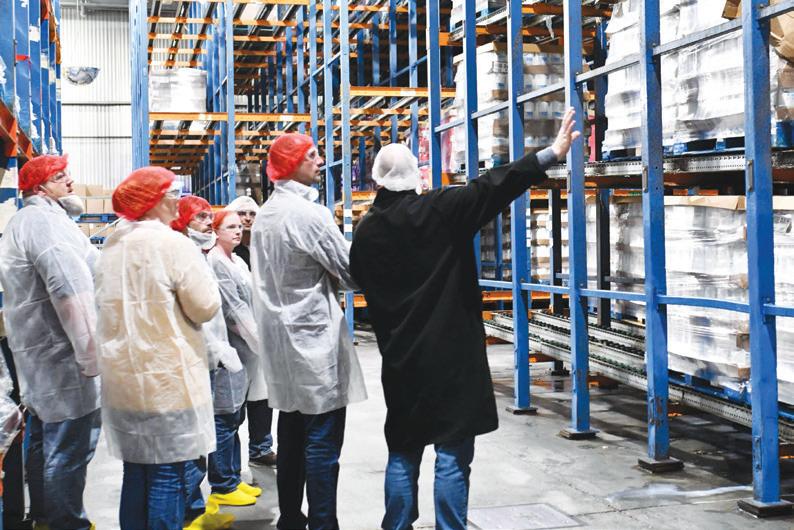
APRIL 3, 2024
Attendees learned about MMPA’s involvement in legislative issues and the role of the Political Action Committee. They heard from U.S. Senator Debbie Stabenow, Chairwoman, U.S. Senate Committee on Agriculture, Nutrition and Forestry about:
• what’s happening in the federal legislative landscape
• progress on the upcoming Farm Bill
• her strong partnership with MMPA and the dairy industry
APRIL 11, 2024
MMPA members traveled to MMPA’s milk processing facility, Superior Dairy, in Canton, Ohio to tour the recently acquired plant and meet MMPA staff. Attendees:
• toured all facets of the plants’ production areas: plant receiving bays, 96-ounce and caseless gallon bottle blowing, ice cream production, milk loading areas and more
• learned about Creative Edge’s role in development of the caseless milk gallon and the evolution of their latest innovation – the 96-ounce bottle
• tasted many products made using their milk at Superior Dairy

APRIL 24, 2024
Attendees learned about MMPA’s forward contracting program and how to sign up. They heard from StoneX, MMPA’s forward contracting partner on:
• the basics of forward contracting
• the benefits of forward contracting
• a market forecast outlook

Dairy for Healthy Child Development
Your dairy checkoff program recently shared science-backed information and resources with Everyday Health and Mayo Clinic to develop searchdriven content for a parenting hub on Mayo’s website. This effort supports checkoff’s goal to increase recognition of dairy’s role in cognition and childhood development. It also builds on an existing partnership with Everyday Health Group which was launched in 2023 and includes content for websites like BabyCenter and Healthline, two of the largest online health properties consulted by new parents.
Checkoff Research Supports New Yogurt Health Claim
The U.S. Department of Agriculture announced the first qualified health claim for yogurt that identifies a potential link between its consumption and a reduced risk of type 2 diabetes. This work exemplifies the importance of farmers’ commitment to investing in research through the National Dairy Council, who continues to conduct research examining the science-backed benefits of yogurt and other dairy foods.

UDIM Hosts a Farmer Communications Workshop
A “reporter,” “politician,” “new neighbor” and an “activist” interviewed dairy farmers at a recent communication workshop to allow the farmers to practice their response to dairy questions. The United Dairy Industry of Michigan (UDIM) Industry Relations team hosted a workshop for 12 dairy farmers and portrayed different personas to give the participants time to use their new communication skills to answer questions about animal care, dairy nutrition and sustainability. Facilitator Polly Sullivan started the workshop by helping participants ground themselves in their passion for dairy and provided key tips to help work through even the toughest questions. The group also heard about dairy nutrition from a UDIM registered dietician and had a conversation about questions they’ve received.
The spring Busch’s Fresh Food Market milk drive reached a new high, overtaking the last drive’s total by raising 51,829 gallons of milk! 11 of the 16 Busch’s stores saw at least 3,000 gallons donated, and 10 of 16 stores hit their target donation amount as set by Busch’s. This milk will be donated to four Southeast Michigan food banks, the region Busch’s serves – Forgotten Harvest, Food Gatherers, Gleaners, and South Michigan – and the milk donation is being matched by $20,000 on the UDIM end to further aid these organizations. Without the support from Michigan’s dairy farmers, generous donations to local communities would not be possible!
UDIM Dollar General Campaign Increases Milk Sales
As part of our goal to increase dairy sales, UDIM partnered with our national office and other local dairy checkoffs on an in-store advertising campaign at Dollar General Stores from November 11, 2023 – January 14, 2024. The signage included a cooler door cling in the dairy case, and a shelf talker sign in the cookie aisle promoting cookies and milk. These appeared in over 2,100 Dollar General stores in Michigan, Indiana, Ohio and West Virginia. Given the success of the campaign, we will explore doing another in-store Dollar General campaign in 2024 to promote fluid milk.
18.8 MILLION IMPRESSIONS
$17.3 MILLION IN FLUID MILK SALES
$1.2 MILLION IN


School Nutrition Professionals continue to nourish future dairy consumers by affecting the food choices and preferences of Indiana’s youth. Food service equipment grants from American Dairy Association Indiana (ADAI) are chosen specifically to assist in feeding more students and using dairy in innovative ways. Equipment granted in fall of 2023 went to K-12 schools across 22 counties, including commercial blenders for smoothie programs, mobile yogurt parfait carts, and glass front refrigerators for Refuel with Milk programs.
ADAI hosted the National Dairy Council’s “Next-Gen Scientist” program to engage early career scientists and build trust with the research community. The intensive 2-day communications training taught scientists why Winners Drink Milk® and how to share their newfound knowledge. Through skill building and immersive experiences, this 3-year program will address perceptions about dairy, create dairy research champions, and amplify our work at prominent universities across the country. Over the 2023 calendar year, ADAI presented to 64 groups and associations, spanning focuses on health and wellness, schools, and agriculture. ADAI also provided 15 media interviews and connected over 1,600 thought leaders through virtual and in-person dairy farm tours.
The American Dairy Association Mideast and Dairy Management Inc. are working with Cincinnati Public Schools (CPS) and Diversified Foods to study how offering lactose-free shelf stable milk, in both white and chocolate, impacts the acceptance and consumption of milk at school.
In the pilot study, shelf-stable white and chocolate lactose-free milk were served, alongside gable top white and chocolate milk, at breakfast and lunch, as part of the USDA School Meal Program during Q4 2023. The results are positive, with more students choosing milk with their meals!
When students have the option to choose shelf-stable chocolate lactose-free milk, meal participation and milk selection increased overall. More students ate school meals and took milk with their meal when lactose-free milk was offered. 80% of younger students surveyed indicated they “liked” or “loved” the chocolate lactose-free milk, and nearly half of all students surveyed indicated they would drink more milk if it was available. Preliminary results suggest availability of chocolate lactose-free milk fills a need for students with real or perceived lactose intolerance.
The Q4 pilot study included six elementary schools and four high schools and has been expanded to include all CPS high schools through June 2024. Once complete, a business case will be developed and shared with other schools for broader implementation.
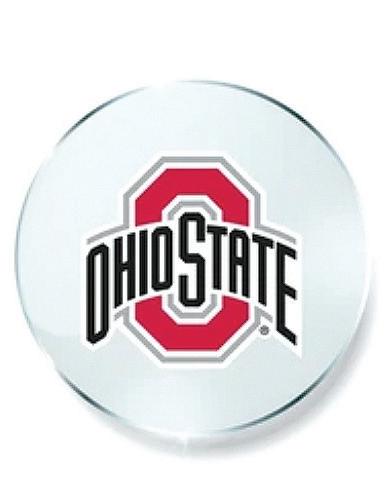
ADA Mideast recently leveraged their sponsorship with Ohio State Athletics to engage five Ohio State collegiate athletes through the NCAA NIL program to share how dairy foods make them “Built like a Buckeye.”
ADA Mideast filmed each athlete performing their sport and why enjoying dairy is important to them. Athletes featured were basketball guard Jacy Sheldon, basketball forward Zed Key, wrestler Rocco Welsh, ice hockey Joe Dunlap and ice hockey goaltender Quinn Kuntz.
The videos were shared on social media by Ohio State Athletics and the athletes in February and March. To date, the videos combined have received more than 332,350 impressions, nearly 200,000 views and more than 9,500 likes, shares and comments! Scan the QR code to watch a summary of the results.
The Freeliners column is open to current MMPA members who wish to advertise—at no charge— goods or services relating directly to their dairy farm operations.
• An item submitted will be published for no more than two consecutive issues (one issue, unless otherwise requested). After that, it will be withdrawn.
• It will be published again for no more than two consecutive months only if the member resubmits the item by writing or calling the Novi office.
• Reference to a name of a firm or other commercial enterprise with which a member is involved will be deleted, with permission of the member.
• If the member does not wish such deletion, he/ she may choose to have the item published as a Classified Ad at the regular per-line rate.
• Freeliners must be received by the 10th of the month preceding desired month of publication.
FOR SALE: POLLED HOLSTEIN, JERSEY AND NORWEGIAN RED BULLS. AI bred from very functional dams. Many young bulls to choose from. Hardy and healthy with strong feet and legs, raised on pasture. Competitively priced. Young beef bulls also available. For pictures and pedigrees call or text 906-287-0746.
FOR SALE: MILK TRUCK , 1986 International 9L low miles, 2600gal stainless tank. Haul your own save thousands on freight costs! Call Denny at 269-838-6463.
FOR SALE: 4-TON FEED BIN WITH FLEX AUGER. Call 810-728-6237.
FOR SALE: DAIRYPLAN C-21 software system with computer. Call 810-728-6237.
FOR SALE: 800-GALLON MUELLER BULK TANK. H&S 5126 side slinger manure spreader. Call 989-551-5977.
FOR SALE: 3000-GALLON SURGE BULK TANK. Model 87310 Serial No 931001. Was used since new 30 years ago, never moved in that time. Just upgraded to a bigger tank. Included are the Control Box, Wash Pump, 2 single phase 5hp compressors, and a GEA Super Heater. Asking $20,000 and can help you load it. Contact Brian 269-720-7637.

FOR SALE: 2022 & 2023 CORN SILAGE Approximately 15,000 ton. $40 per ton picked up. Location South Clare County. Call or text Tim 989-429-6002.
FOR SALE: FUTURECOW TEAT PREP SYSTEM, COMPLETE SYSTEM. Control box, chemical mixer/pump, cable and 3 extra scrubbers. Worked great, no longer used after robots installed. $10,000 OBO. Call 231-578-3007.
FOR SALE: VIRGIN HOLSTEIN BULLS, 15 months old and up. Lew-Max genetics, purchased as wet calves. Call 989-640-9420.
FOR SALE: NICE HOLSTEIN, JERSEY AND HOLSTEIN/ JERSEY CROSS HEIFERS. All sizes. Call 260-705-8185.
FOR SALE: FRESH FIRST LACTATION COWS WITH SOLID GENETICS. 14-50 days fresh. Call or text 734-776-0285.
FOR SALE: 400+ SCR COW COLLARS. Some in almost new condition and under warranty. Best offer. Contact Kevin at 989-277-2880.
FOR SALE: CASE IH 7250 6593 hours in use so can change, condition is above average needs a cab kit. Very sound original tractor used for pulling tandem Brillion seeders and other light work, 2nd owner bought at 3,800 hours. Good work horse. $52,500 front duals have never used, but are included. Call 989-551-0681.
FOR SALE: BRILLION 12.5 FT. SEEDER, GRASS AND ALFALFA SPLIT BOX. Bought new in excellent condition 14,750. 2 available. If purchasing 2 tandem hitch available older style but works well for $3500. Case IH puma 210 approx. 5,600 hours in use so can change. Loaded heated seats, light package. Set up for 30-inch rows, deluxe electronic hydraulics $55,000. 32 ft. unverferth double basket minimal use $8,500. Call 989-551-0681.
C lassifieds Policy
Cost for classifieds is $25 for the first 35 words and then $5 for each additional word. Payment due with order. All ads must be received by the 10th of the month preceding desired month of publication. MMPA neither sponsors nor endorses products or services advertised in the Milk Messenger
OPPERMAN GROOVING: We can fix your scabbled floors. Diamond sawed grooves, no hammering or cracking of concrete. No hoof damage. Call Opperman Grooving Inc., Portland. 517-647-7381.
DAVIDSON CEMENT GROOVING, INC: No water needed. Wider, rougher grooves for better traction. We also offer texturing for your previously grooved floors. Three operators will travel Michigan and other states. No interest payment terms. Est. 1987. 800-365-3361.
CONCRETE GROOVING BY TRI-STATE SCABBLING:
Home of the 2” wide groove. Best traction, lowest prices. Call 800-554-2288. www.tristatescabbling.com
A SURE WAY TO KEEP YOUR COWS UPRIGHT!
Concrete grooving/texturing provides high quality traction in new and old concrete, fast service. NIENOW GROOVING. Call Cliff at 989-635-1494.
FOR SALE: NEW & USED MILK TANKS. We stock all sizes, makes, models. Special prices to co-op members, corporate & private farms. Contact us anytime day or night. Special on 2000 gal. Muellers for $13,900 & up. 2700 & 4000 gal. Muellers call for quote. 800-558-0112.
STRAW & DRY HAY (large & small bales). Feed Oats, Feed Barley and Corn Silage. Delivery available. Call 989-723-1886 or 989-277-1414.
ALFALFA HAYLAGE (EXCELLENT & FAIR GRADES) & CORN SILAGE. Please call 989-723-1886 or 989-277-1414.
NEW KATOLIGHT PTO GENERATOR, 60 KW. Keep everyone warm and producing in the event of a power outage. Call Brent at 248-770-5122.
SEED CORN - "MINNESOTA 13" Open Pollinated 85 Day Yellow Field Corn Seed. High Protein, High Yield, High Fat, Fast Drydown. Great Digestibility! 80,000 graded seeds $100.00 JanksSeeds.com 989-284-5052.
BARN WHITE WASHING AND CLEANING WITH HIGH PRESSURE AIR: Serving all Michigan and Indiana. Miller Spray Service, Inc. 574-825-9776.
WHEAT STRAW 3 X 4 X 8 BALES. Alfalfa Hay 3 X 4 X 8 Bales and some cubes. Call John 517-881-2722.
OPEN POLLINATED CORN SEED. Early Varieties ***Green Haven Open Pollinated Seed. Hulles Oats, Einkorn Wheat. Call 607-566-9253. www.openpollinated.com

The MMPA Farm Supply Store is now stocking Virkon S, a highly effective broad-spectrum disinfectant for use on non-porous surfaces in livestock containment areas and on production equipment. The Farm Supply Store is carrying the powder version which is recommended to be diluted in water at the rate of one scoop per gallon (1.3 oz/gallon). Once the area to be disinfected is cleaned, the Virkon solution may be applied with a cloth, mop or spray. It is recommended to keep the surface wet for ten minutes for effectively kill for most pathogens, including Highly Pathogenic Avian Influenza. Surfaces should be allowed to air dry before reintroducing livestock. Areas or vessels that will hold feed or water for animal consumption should be well rinsed with clean water prior to use.
Virkon S can be a great addition to your farm’s biosecurity protocol. This product is used by MMPA field staff to disinfect their footwear prior to entering and immediately after leaving dairy facilities. Please contact the Farm Supply Store at 989-317-8370 to learn more.
$100.93 for 10-pound pail
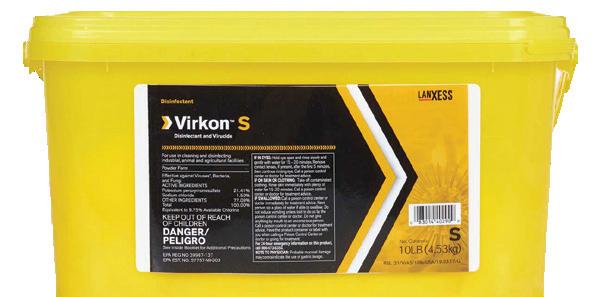
How to Order MMPA Merchandise from the FARM SUPPLY STORE
Call in your order: Main Line: 989-317-8370 Toll Free: 877-367-6455
Orders (Novi): 800-572-5824 then dial 2
Fax in your order: 989-317-8372
These are SERVICE personnel only. Order your supplies through your hauler.
24-Hour Medical Emergency Hotline: 1-800-328-0026
Service Message Center: 1-800-392-3392
Service Representatives:
» Pat Mitchell – 517-403-0928 - 7273 N. Rollin Hwy., Addison, MI 49220
» Jason Wolfe – 540-553-5755 - 1890 Canter Drive, Riner, VA 24149
Ben Chapin, Remus, Member Services Director ............... 989-289-0731
Steve Lehman, Ithaca, Raw Milk Compliance 989-330-1638
Doug Soehnlen, Member/Superior Supply Representative 330-575-4643
Joe Packard – Area Supervisor
248-520-3481
Brandon Ewers, Coldwater 231-414-4539
Alyssa Stace, Elkhart, IN, Animal Care/Sustainability 269-967-7351
Emily Patton, Lansing 248-880-3785
Christy Dinsmoore – Area Supervisor
248-513-7920
Dustin Hooks, Ossineke, MI ........................................................ 269-245-6632
Carley VanNorman, Ruth, MI 248-826-6294
Chelsea Smith, Falmouth, MI 231-519-2455
Lindsay Green, DeWitt, Animal Care /Sustainability 989-488-8159
Sarah Michalek – Farm Sustainability Manager
248-305-0537
Deb Gingrich, Leroy, Animal Care/Sustainability 248-520-3580
Rachel Brown, Charlotte, Sustainability Coordinator 248-826-7243
Novi (Monday-Friday, 8 a.m.-4:30 p.m.)
In Michigan
Toll Free
Ovid (Daily, 6 a.m.-10 p.m.)
Constantine (Daily, 7 a.m.-10 p.m.)
800-572-5824
800-233-2405
989-834-2515
800-391-7560
Supervisor: Katie Pierson, Mt. Pleasant
Main Line
989-317-8370
Toll Free 877-367-6455
Orders (Novi) 800-572-5824, then dial 2
Fax 989-317-8372
Farm Supply Sales Representative
Jake Riley, Mt. Pleasant
248-912-5070
John Lehman, Elsie, Bulk Tank Calibration................................ 248-444-6775
Main Office
Local line
248-474-6672
Toll free ............................................................................... 800-572-5824
President and Chief Executive Officer
Joe Diglio ext. 202
Chief Corporate Affairs Officer
Sheila Burkhardt ext. 208
Chief Operations and Business Development Officer
Greg Soehnlen ext. 341
Director of Business Development
Brad Parks ext. 341
Laboratory Supervisor
Teresa Farmer ............................................................................... ext. 219
Quality
Sudeep Jain ext. 305
Member Services
Emily Keranen ext. 203
Human Resources
Kelly Kerrigan ext. 301
Commodity Sales
Molly Costaris ext. 209
Communications
Emily Kittendorf ext. 234
Corporate Controller
Jeannie Strain ext. 312
Member Relations
Jessica Welch ............................................................................... ext. 303
Canton, Ohio Plant Manager 330-477-4515
Constantine, Michigan
Dave Davis, Plant Manager 269-435-2835
Ovid, Michigan
Glen Kienitz, Plant Manager 989-834-2221
Middlebury Cheese Company, Middlebury, Indiana Plant Manager ....................................................................... 574-825-9511
If you are unable to reach your assigned member representative, please contact the representatives listed in your area. Your assigned member representative is listed on your quality statements or can be found by visiting mimilk.com/contact/field-staff and searching by your producer number.
Officers
Doug Chapin, Board Chairman
Tony Jandernoa Board Vice Chairman
Eric Frahm, Treasurer
Joe Diglio, President and CEO
Sheila Burkhardt, Secretary
Greg Soehnlen, COO Todd Hoppe, General Counsel
Directors-At-Large
Aaron Gasper, Lowell, MI 616-291-4092
Bruce Benthem, McBain, MI 231-920-1615
Kris Wardin, St. Johns, MI 989-640-9420
District Directors
1 Paul Keener Ashland, OH 330-988-0139
1 Kurt Steiner Creston, OH 330-464-1219
2 Brian DeMann Martin, MI 269-720-7637
2 Brian Preston Quincy, MI 517-376-1350
3 Doug Chapin Remus, MI 231-349-4059
3 Amy Martin LeRoy, MI 231-388-0496
4 Eric Frahm Frankenmuth, MI 989-652-3552
4 Corby Werth Alpena, MI 989-464-5436
5 Tony Jandernoa Fowler, MI 989-593-22245
5 Scott Lamb Jeddo, MI 810-327-6135

In spring’s green fields, a calf roams near, curious eyes sparkle, without a care. Not far behind, her mom in black and white, watching on carefully, a peaceful sight.
Farmers plant fields in earth’s warm embrace, life blooms anew in this tranquil space.
Cow and calf, in nature’s tender grace, paint a scene of springtime’s embrace.
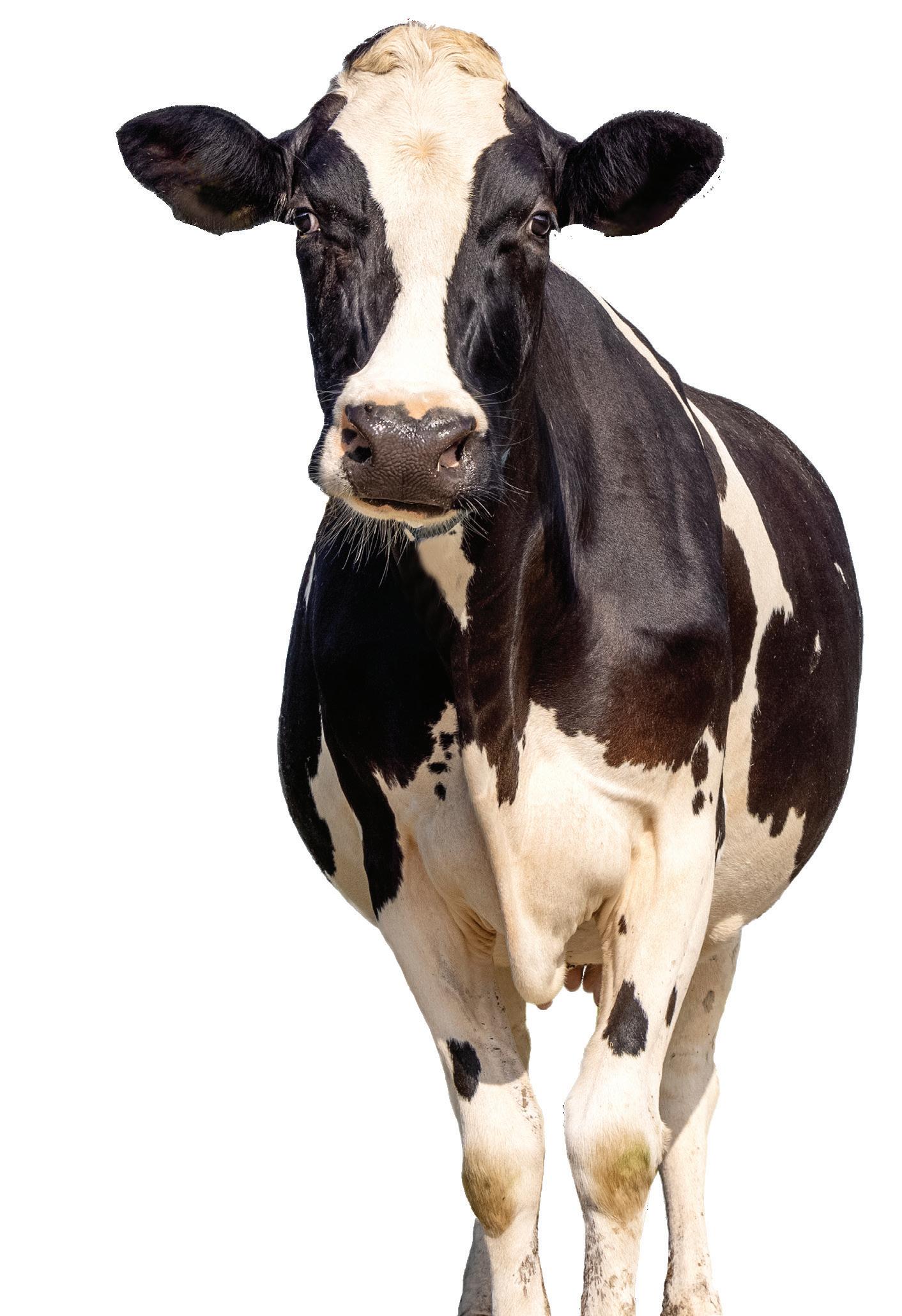

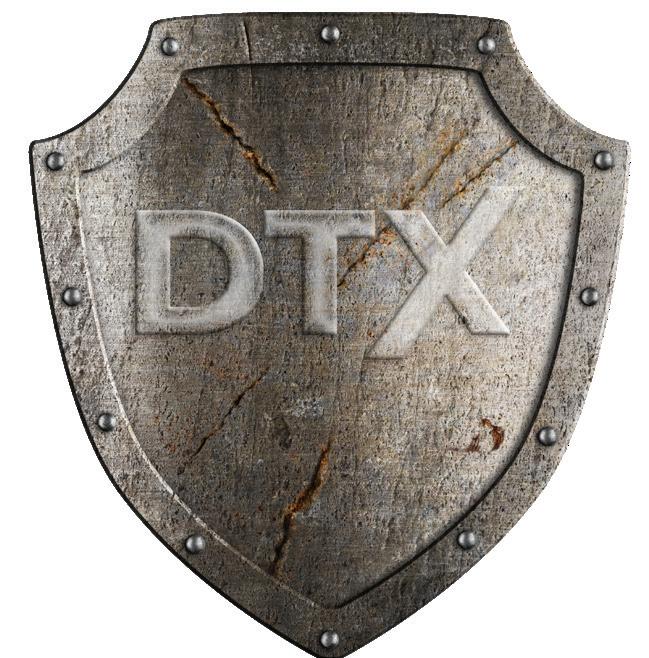


Controlled, third-party research confirms 25 years of experience.
Feeding DTX to mycotoxin-challenged, lactating cows:
DAILY MILK PRODUCTION INCREASED 2.5 lb/cow for the first 150 DIM
29.3% IMPROVEMENT
Artificial insemination pregnancy rates from Control 36.5% to DTX 47.2%
15.6% IMPROVEMENT
Embryo transfer pregnancy rates from Control 27.6% to DTX 31.9%
GREATER THAN 3.5:1 ROI
